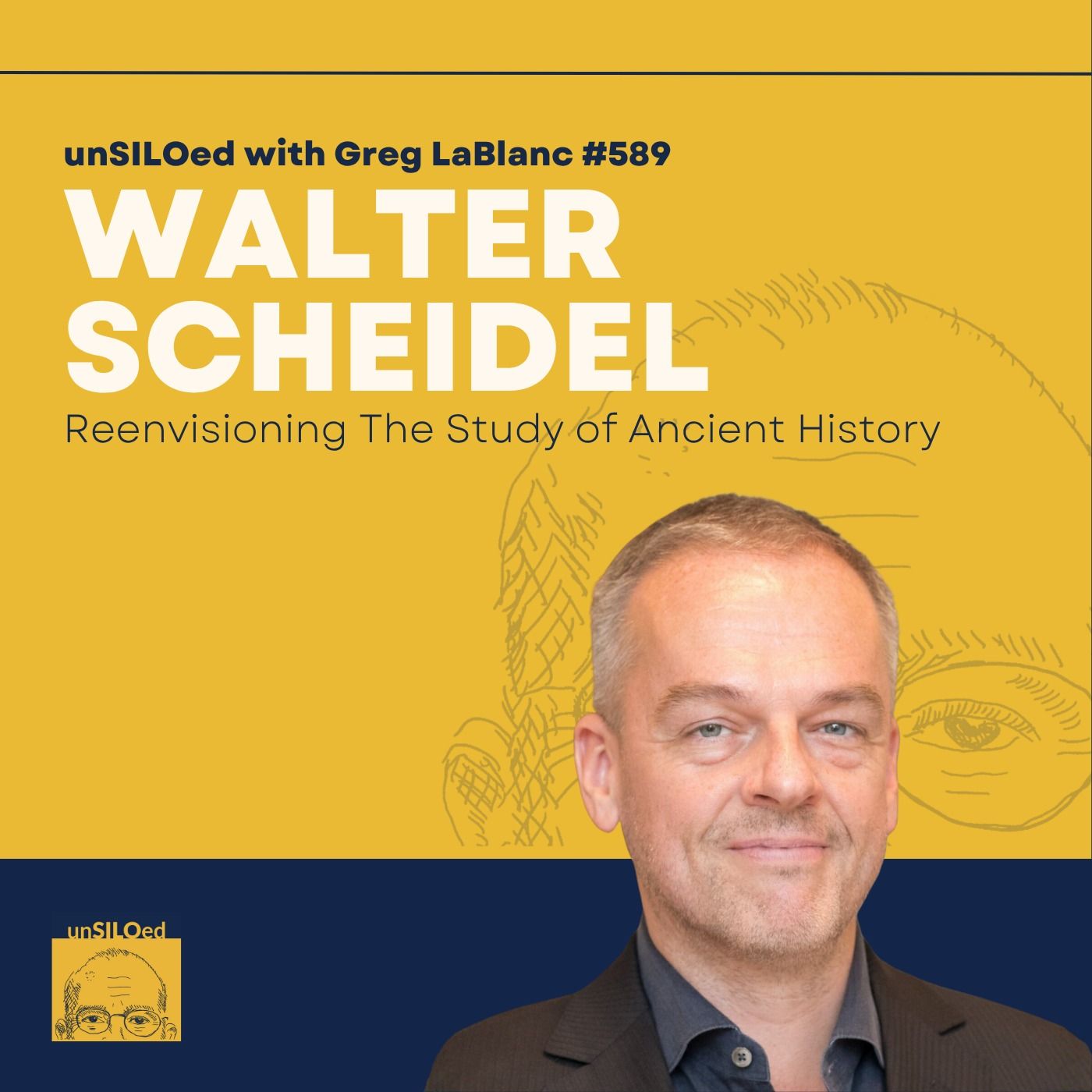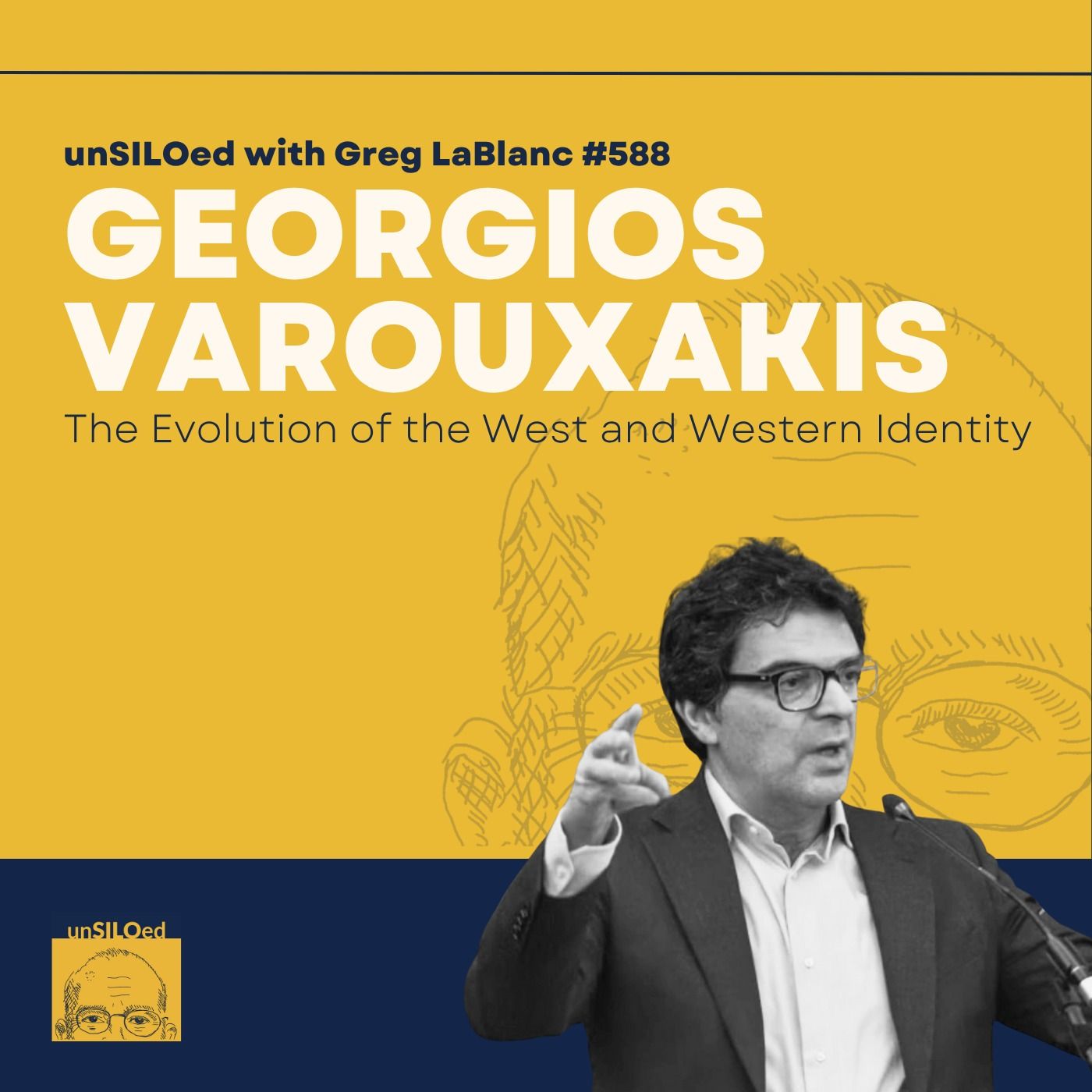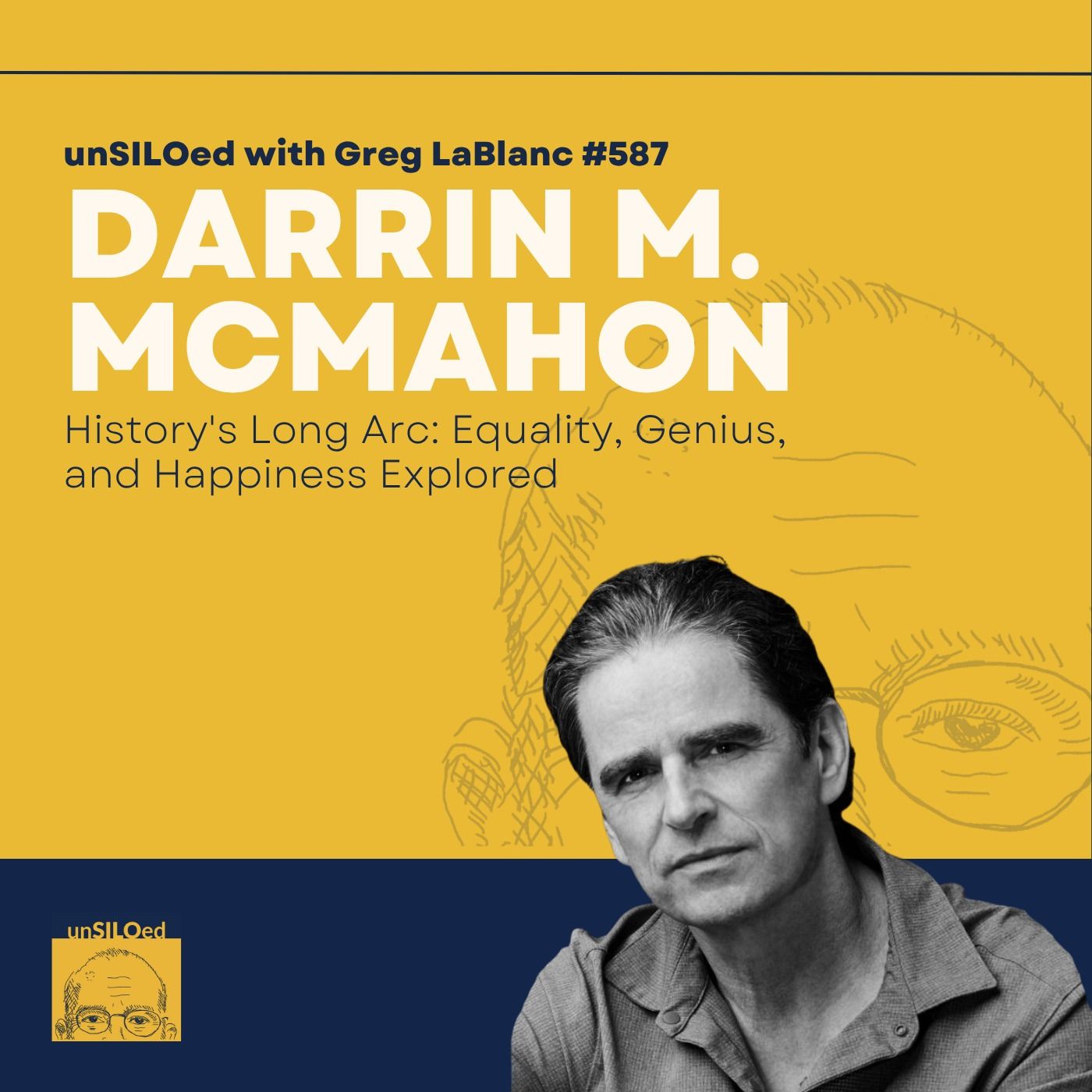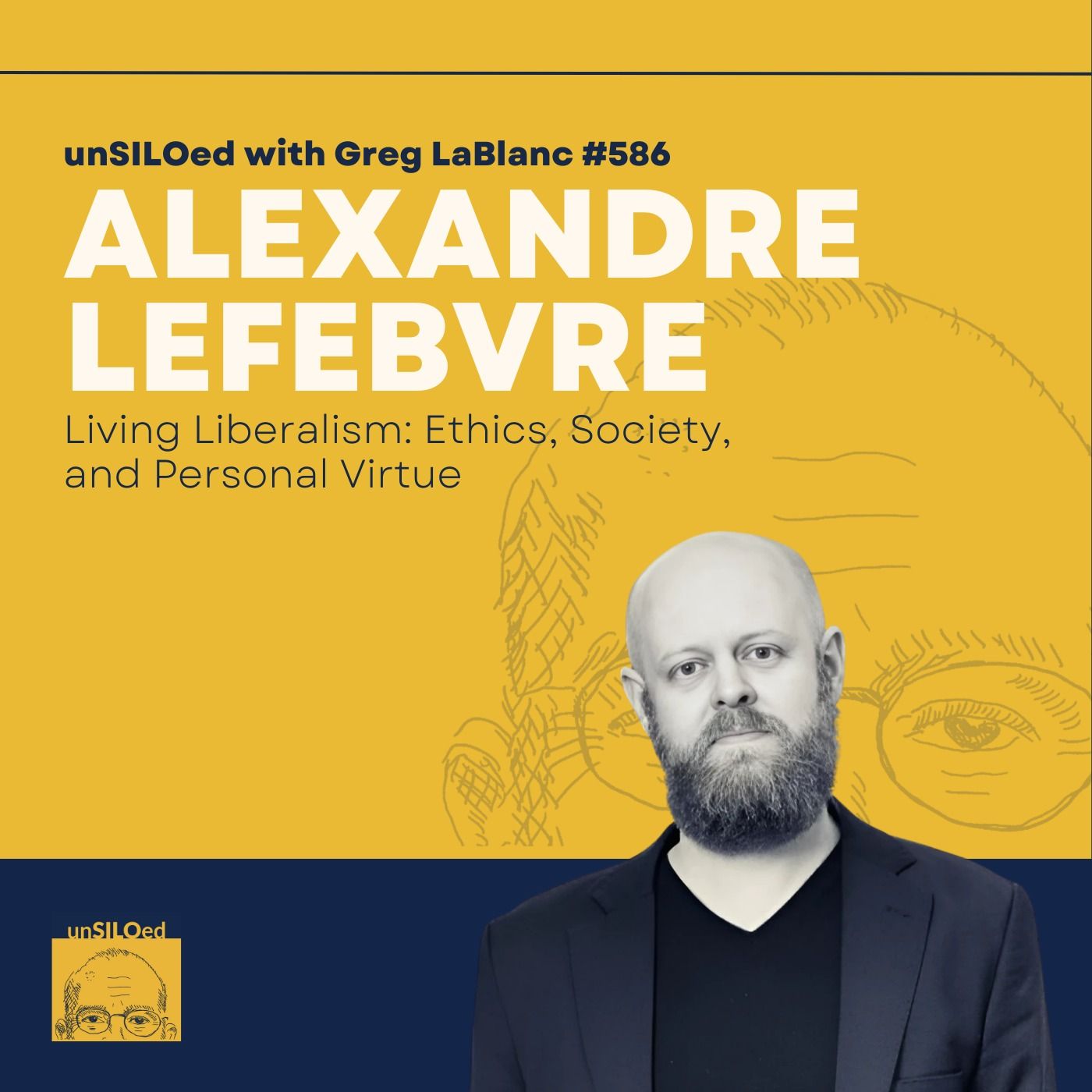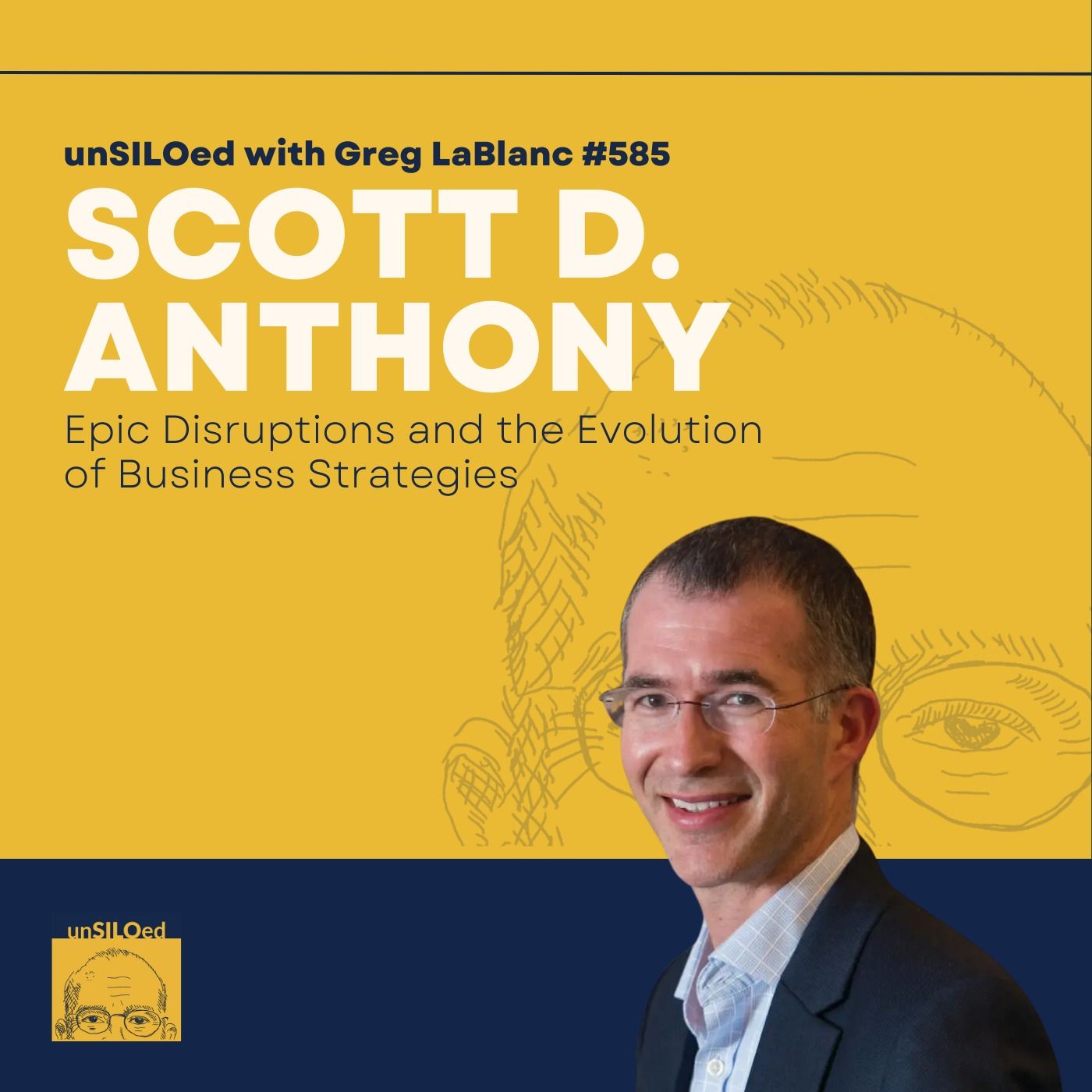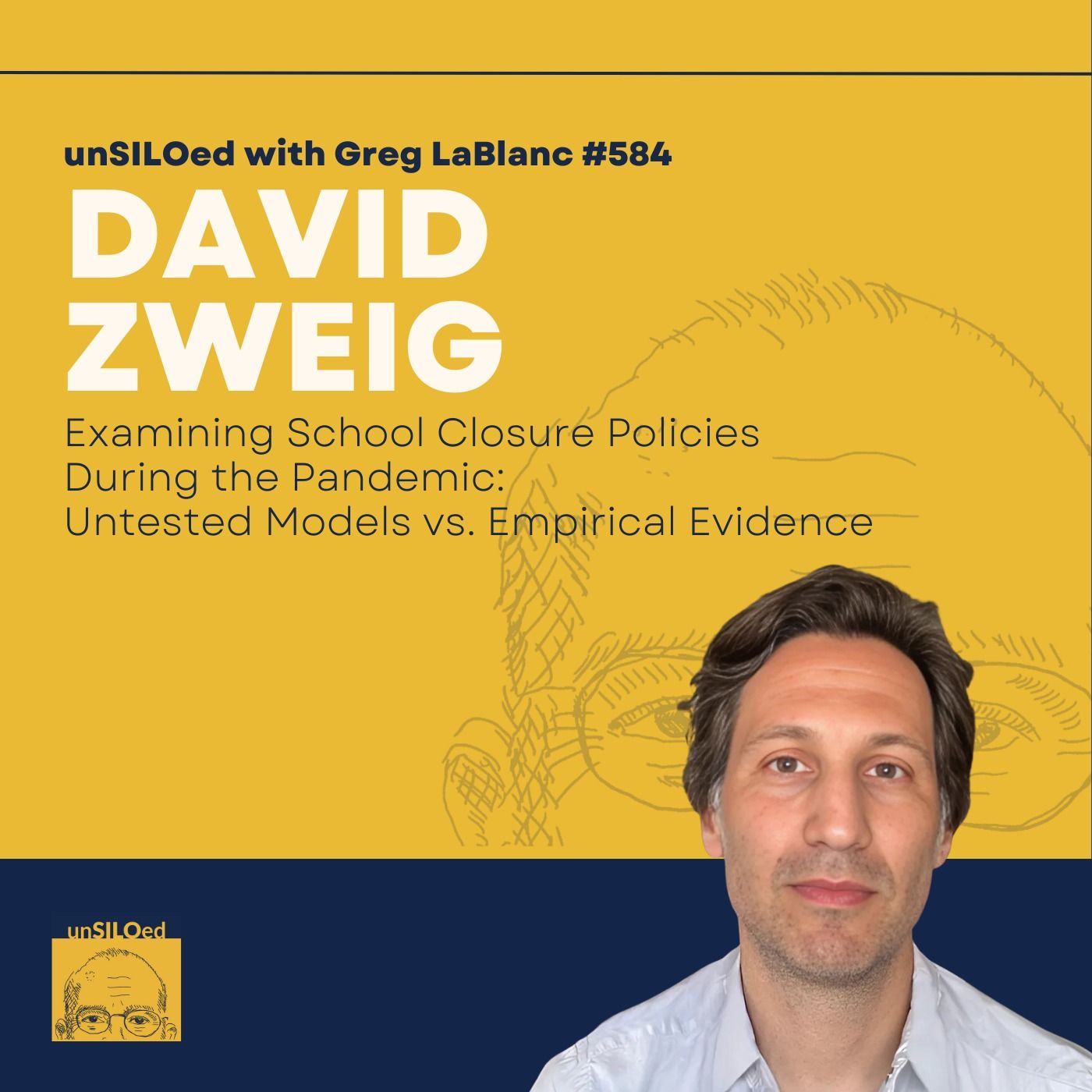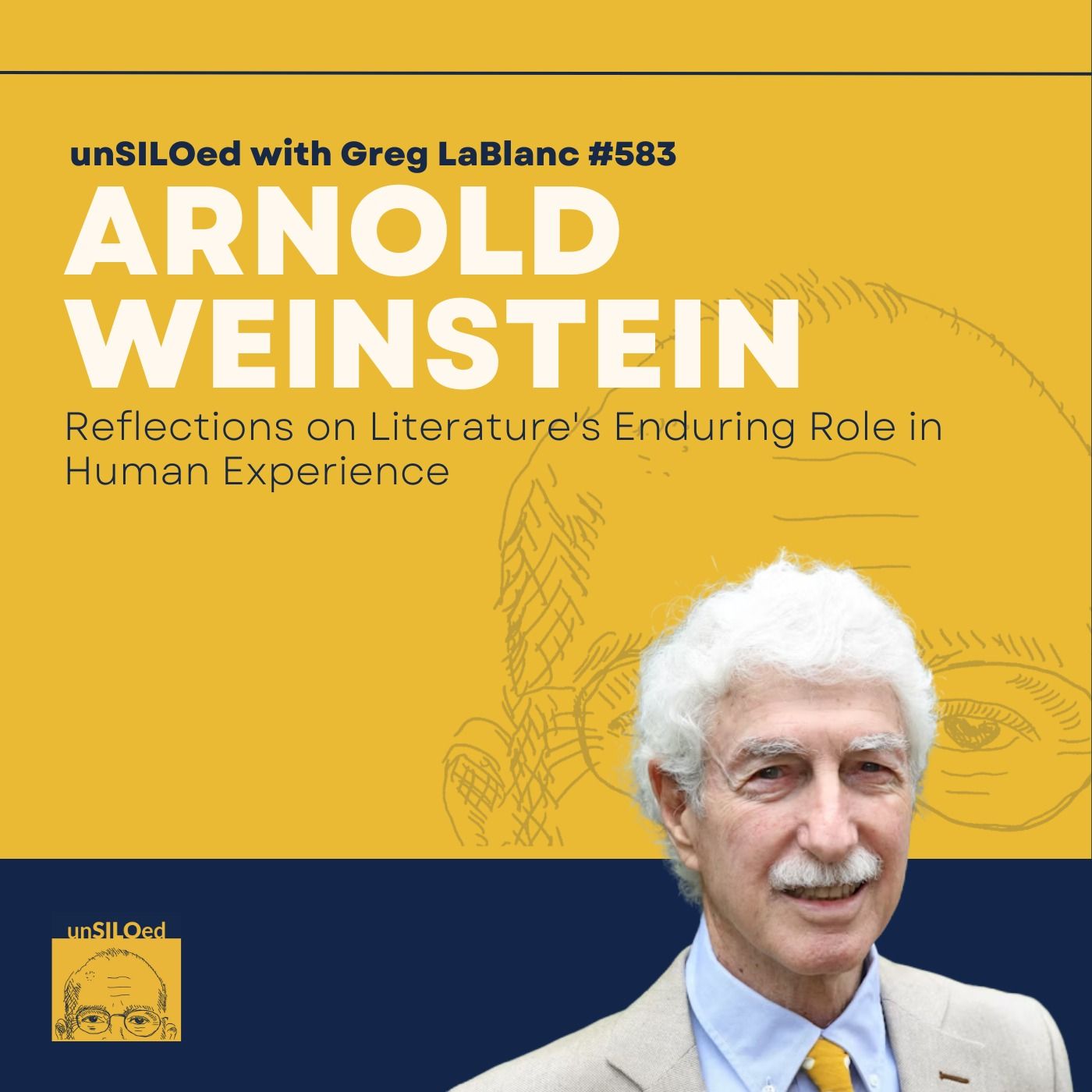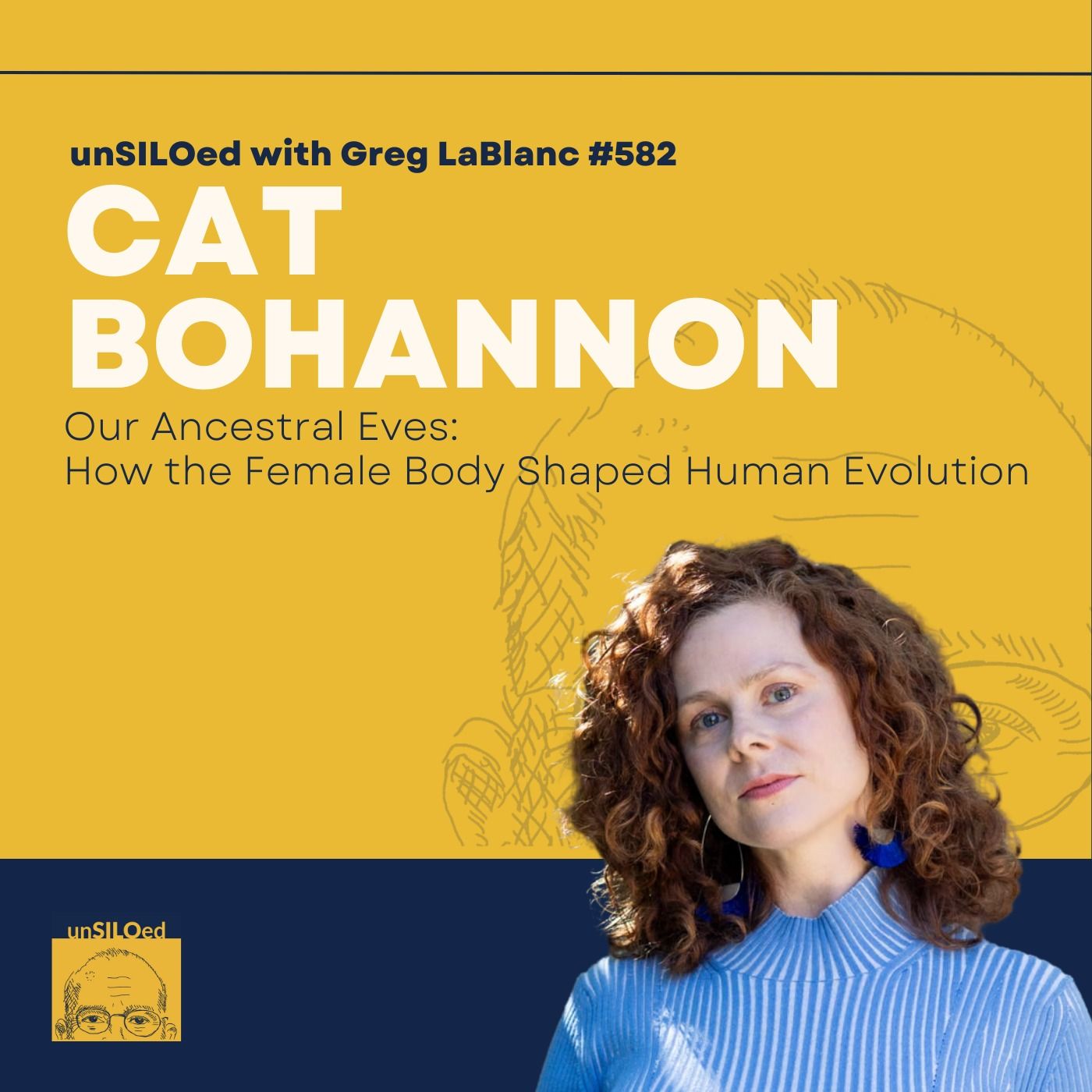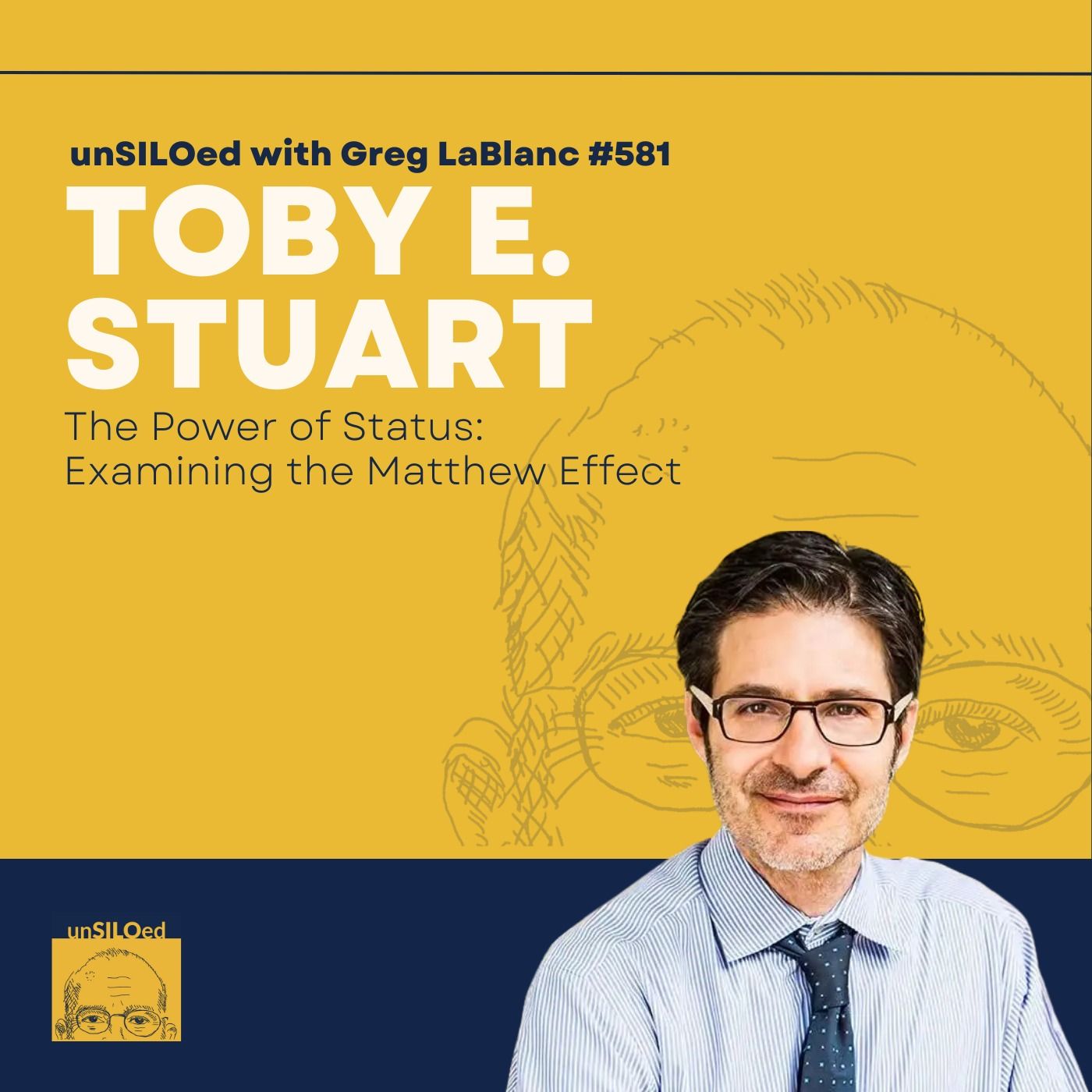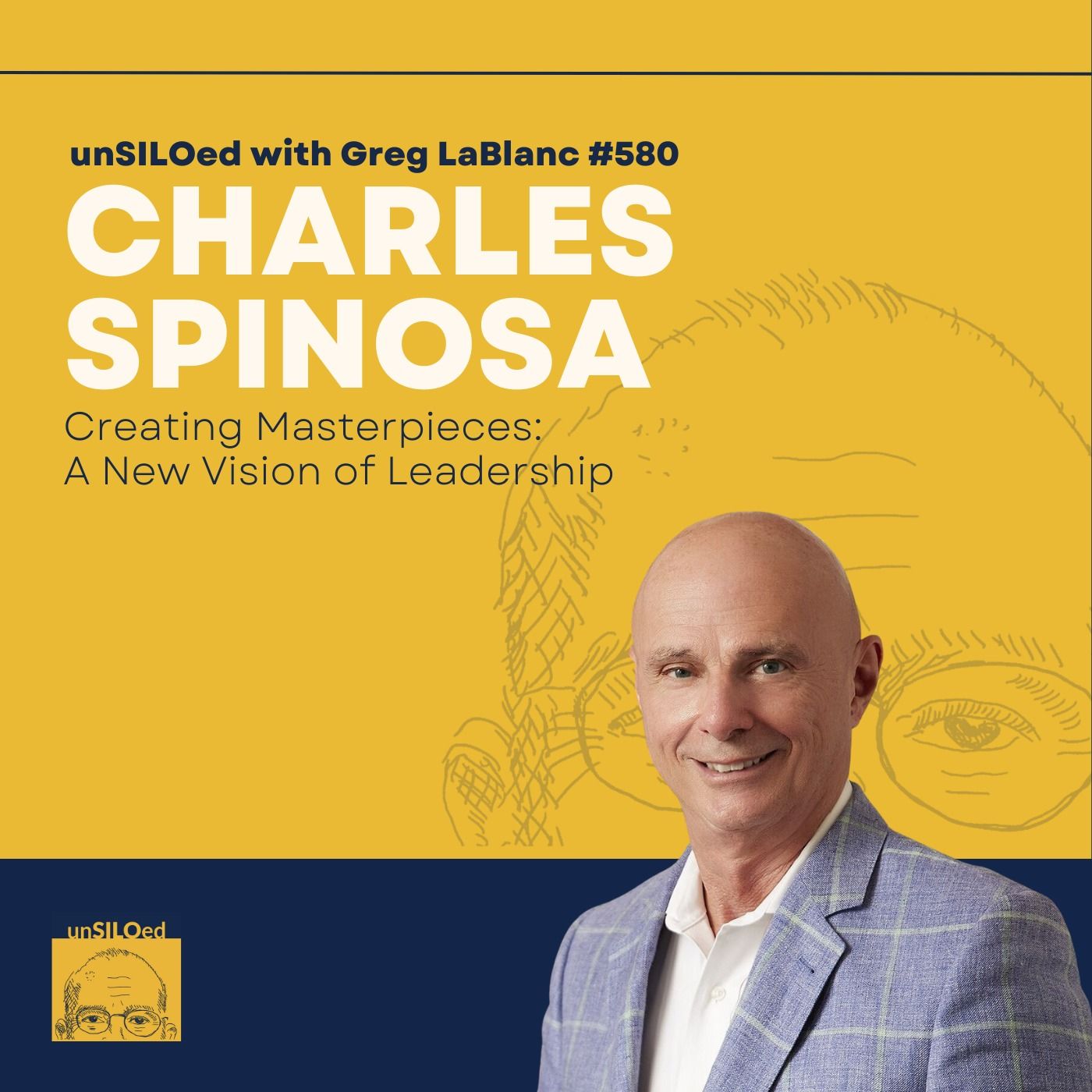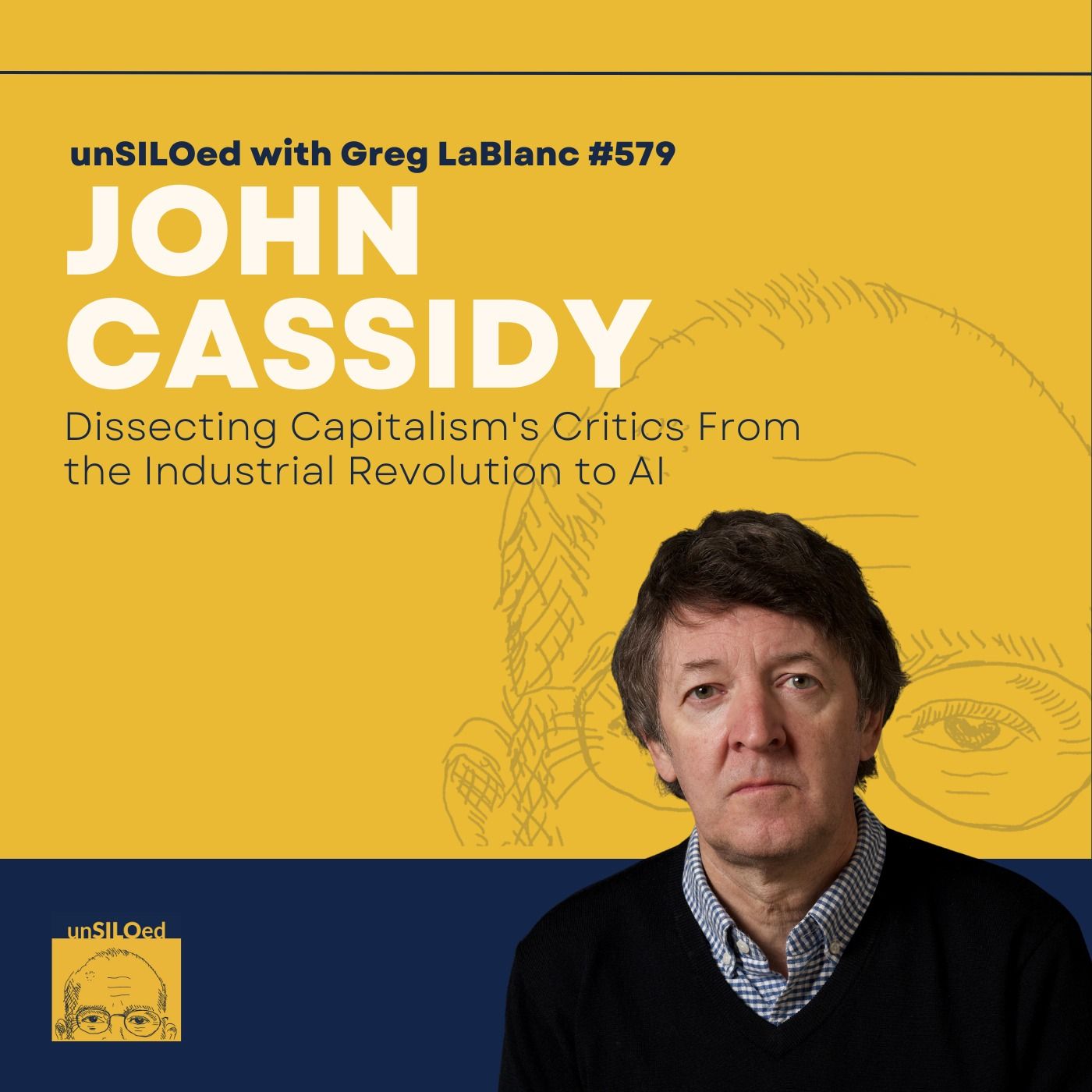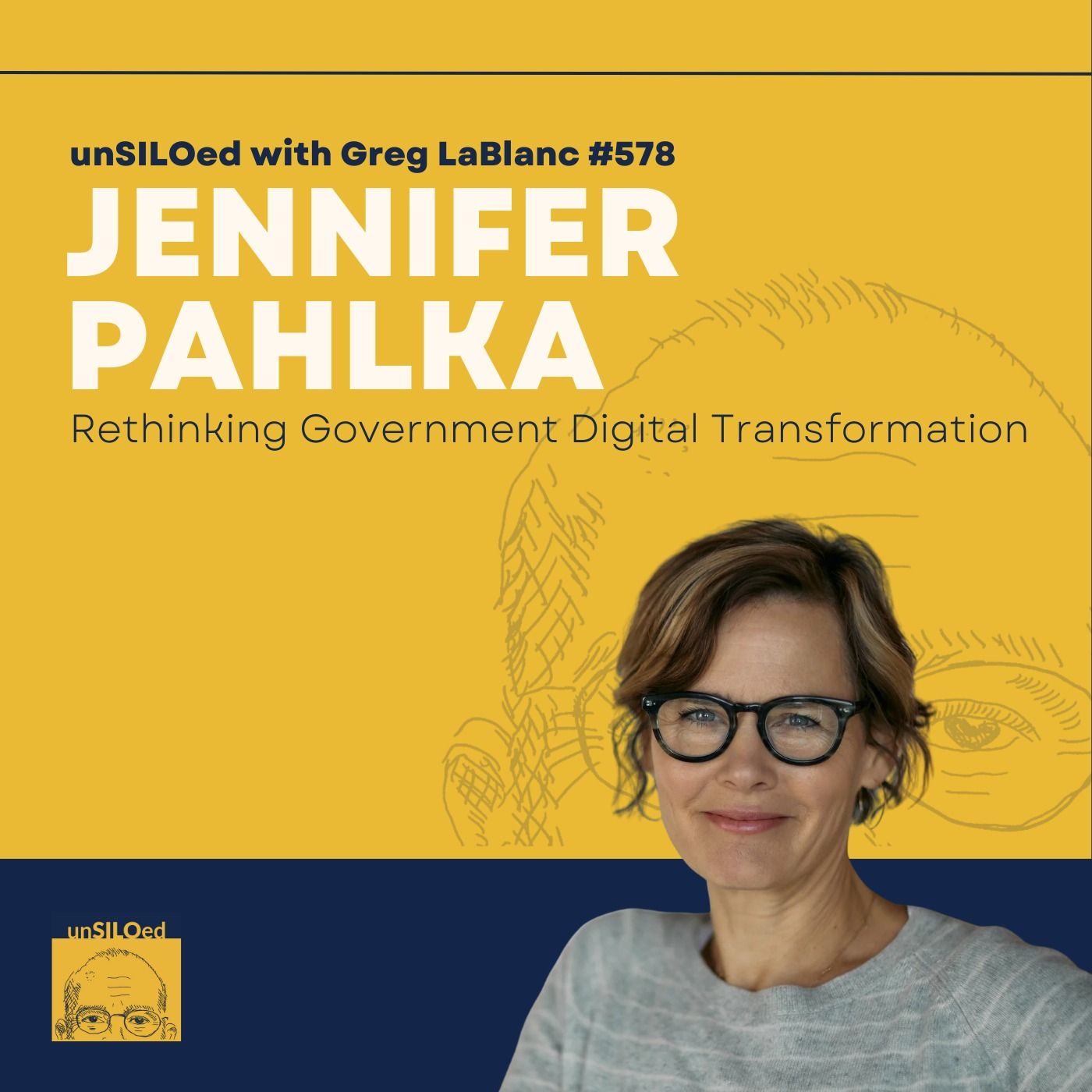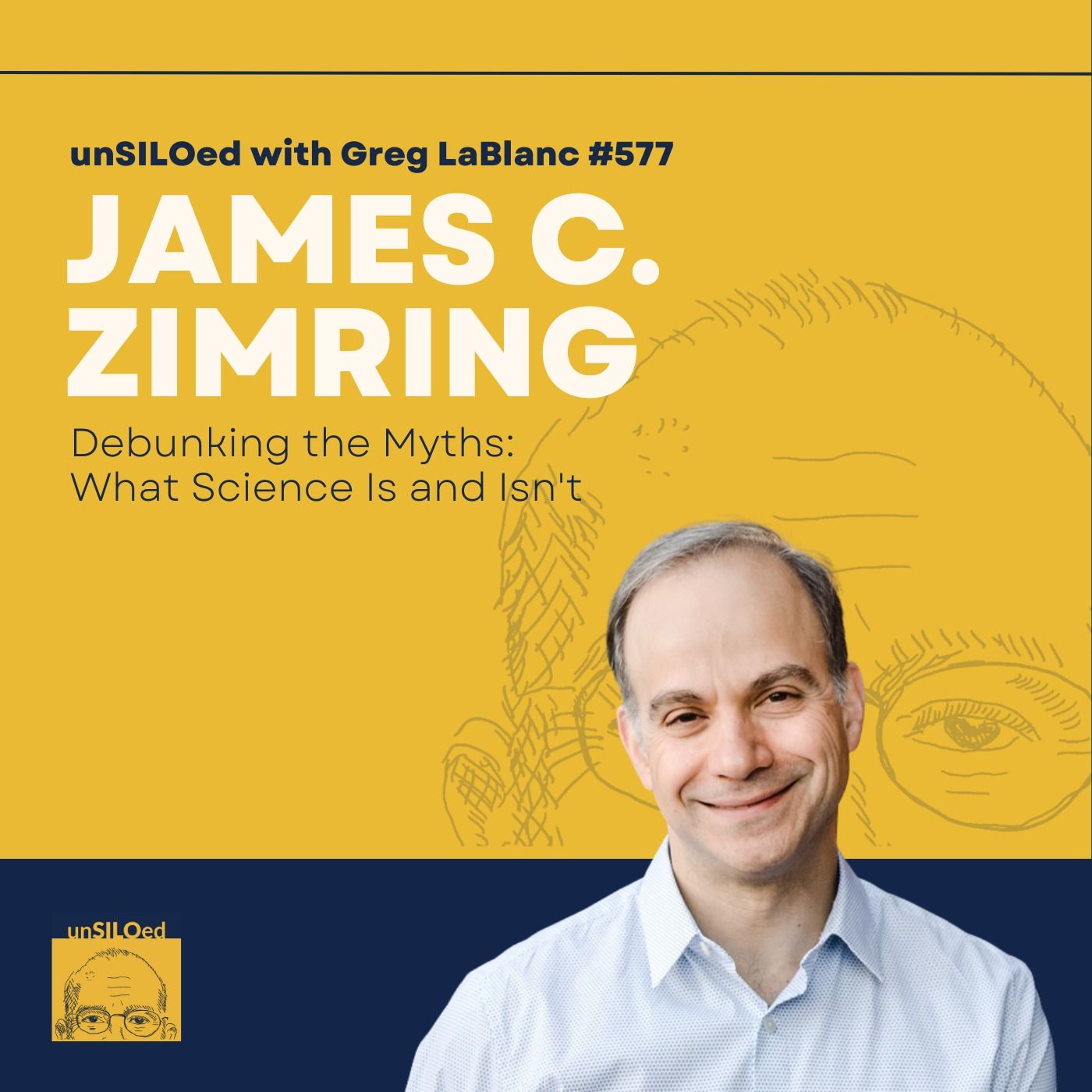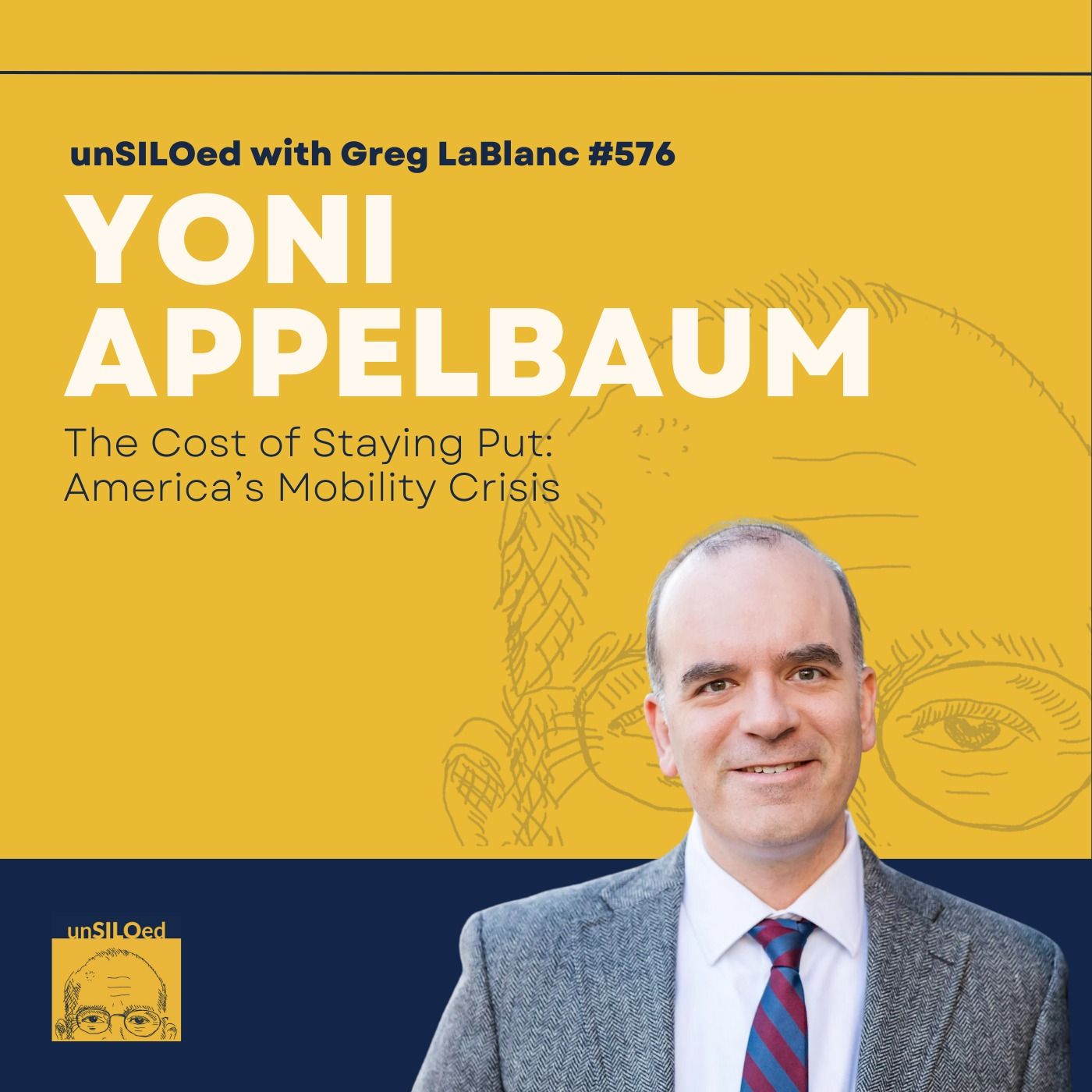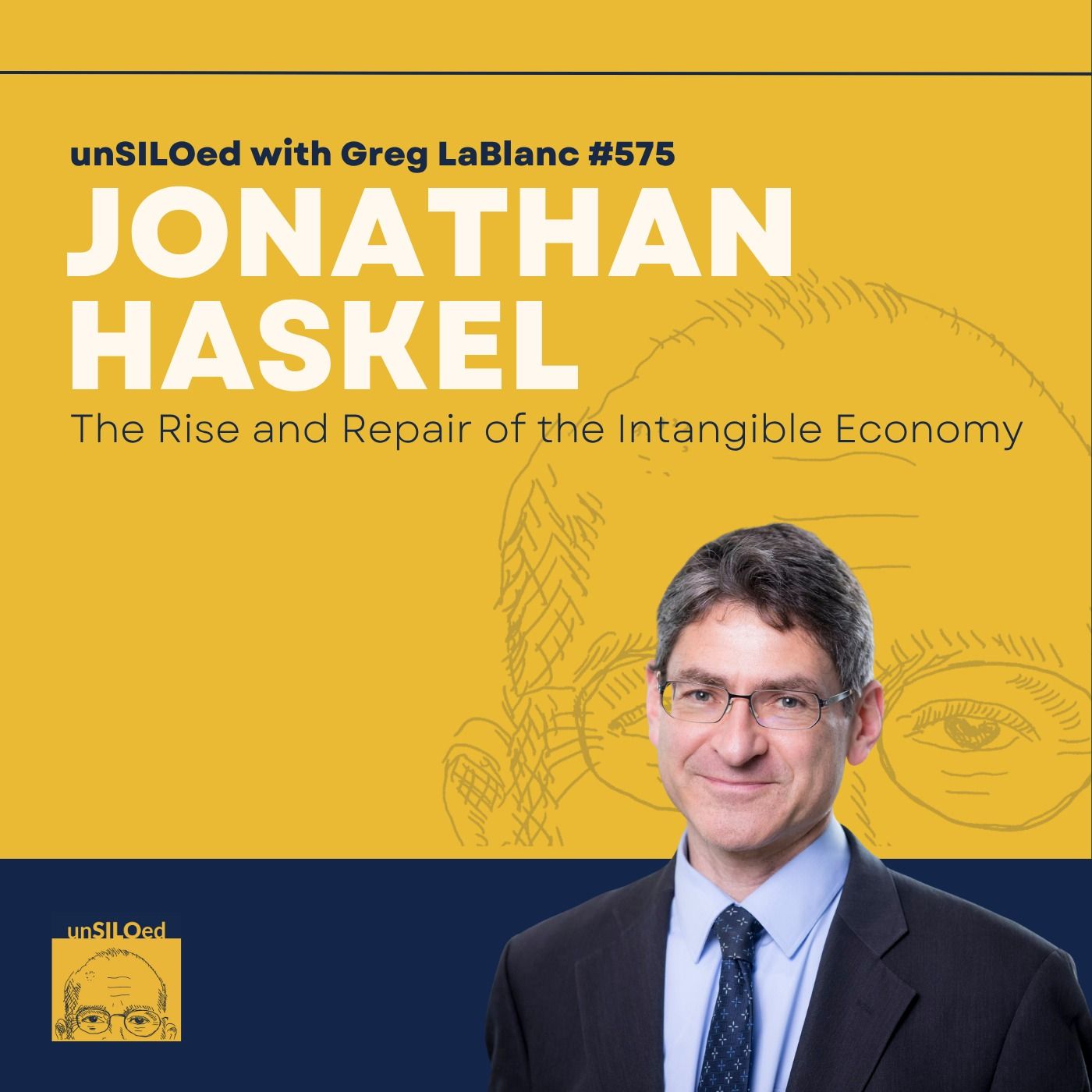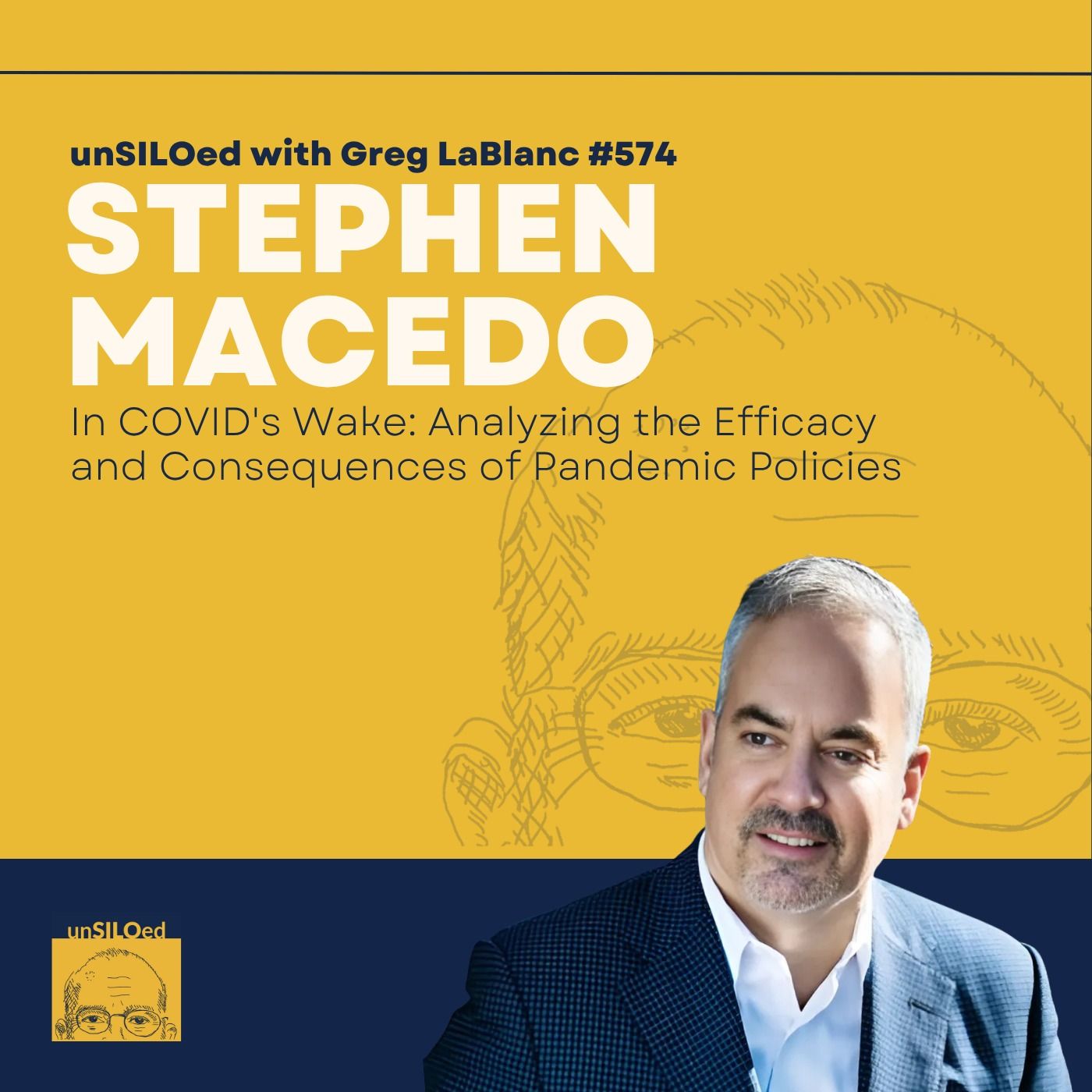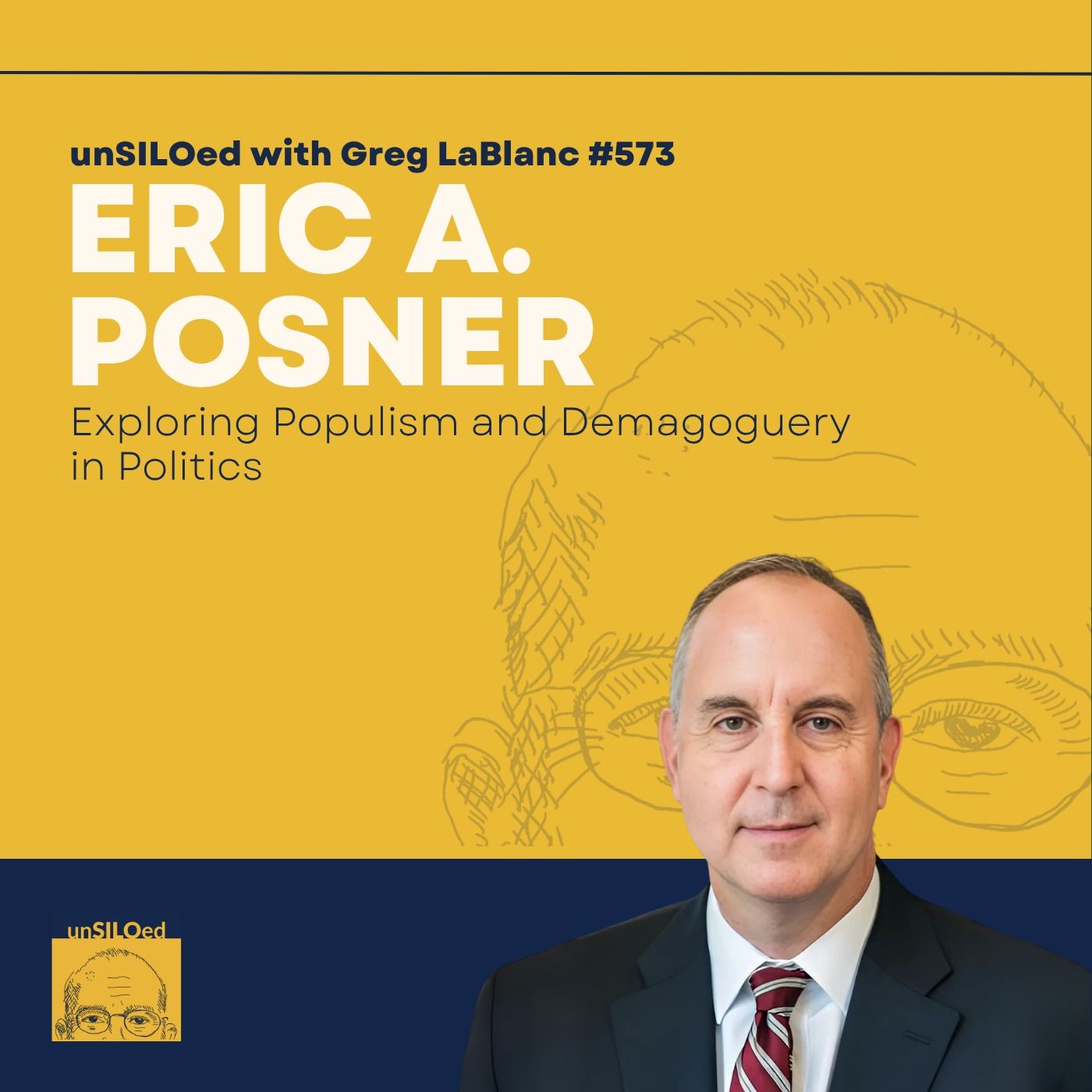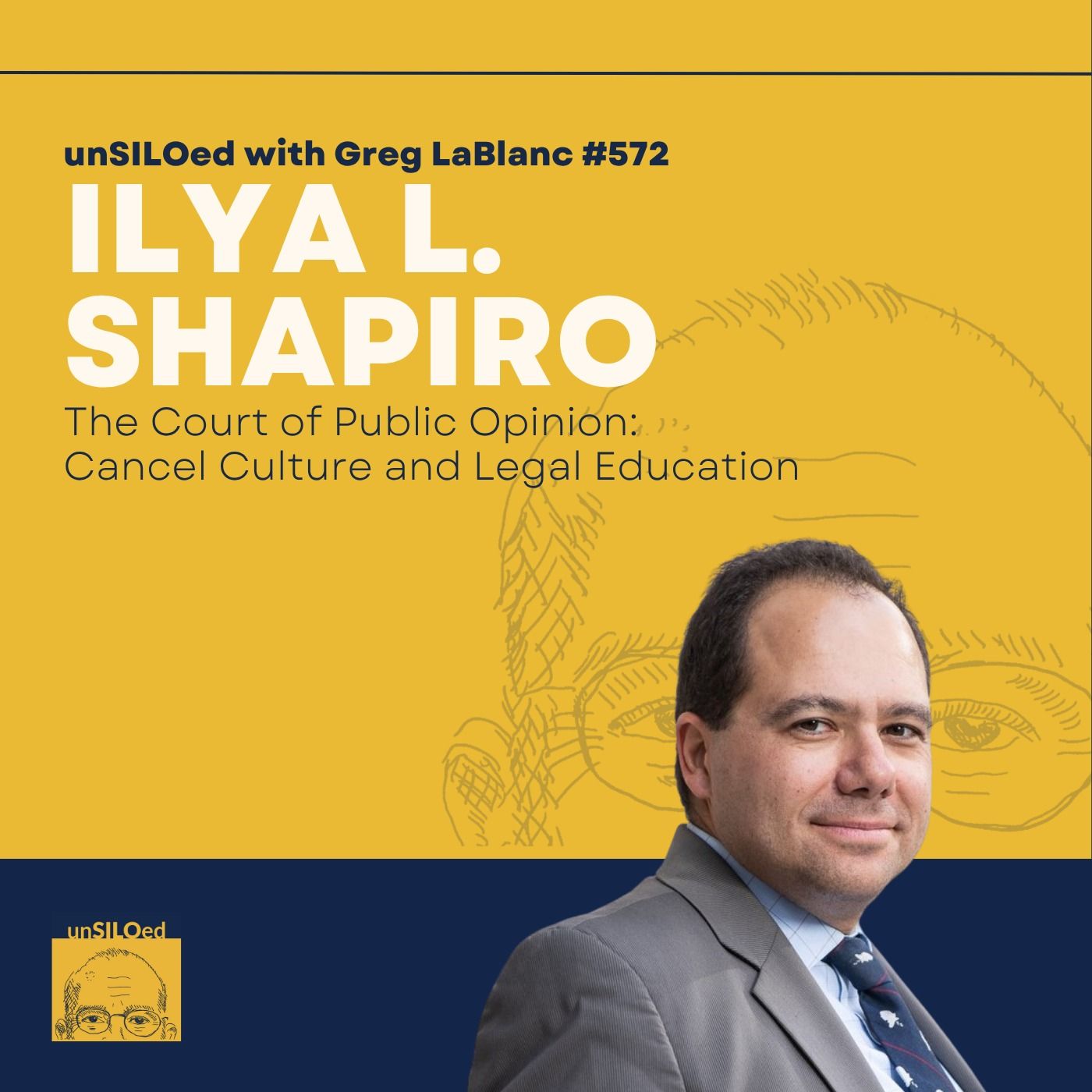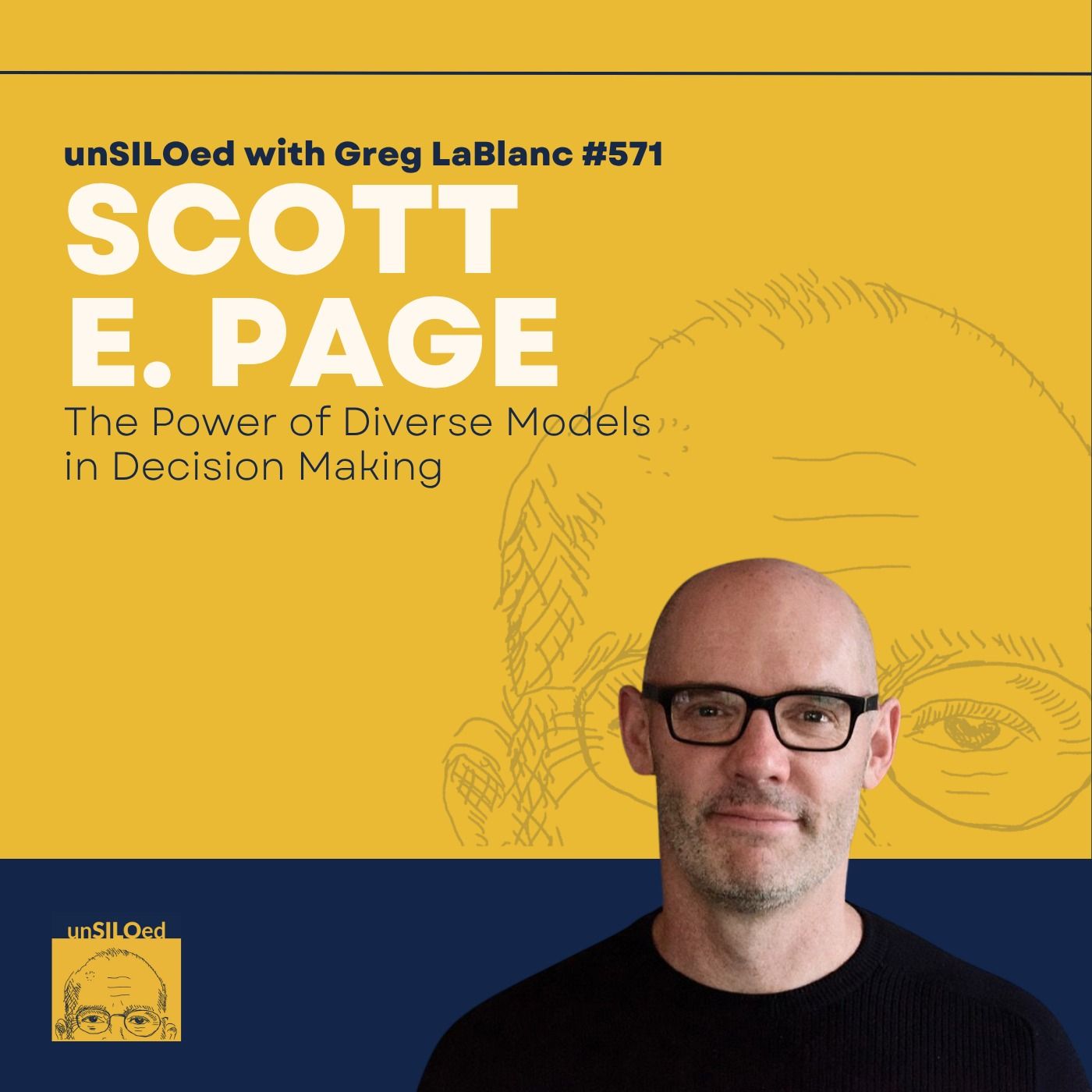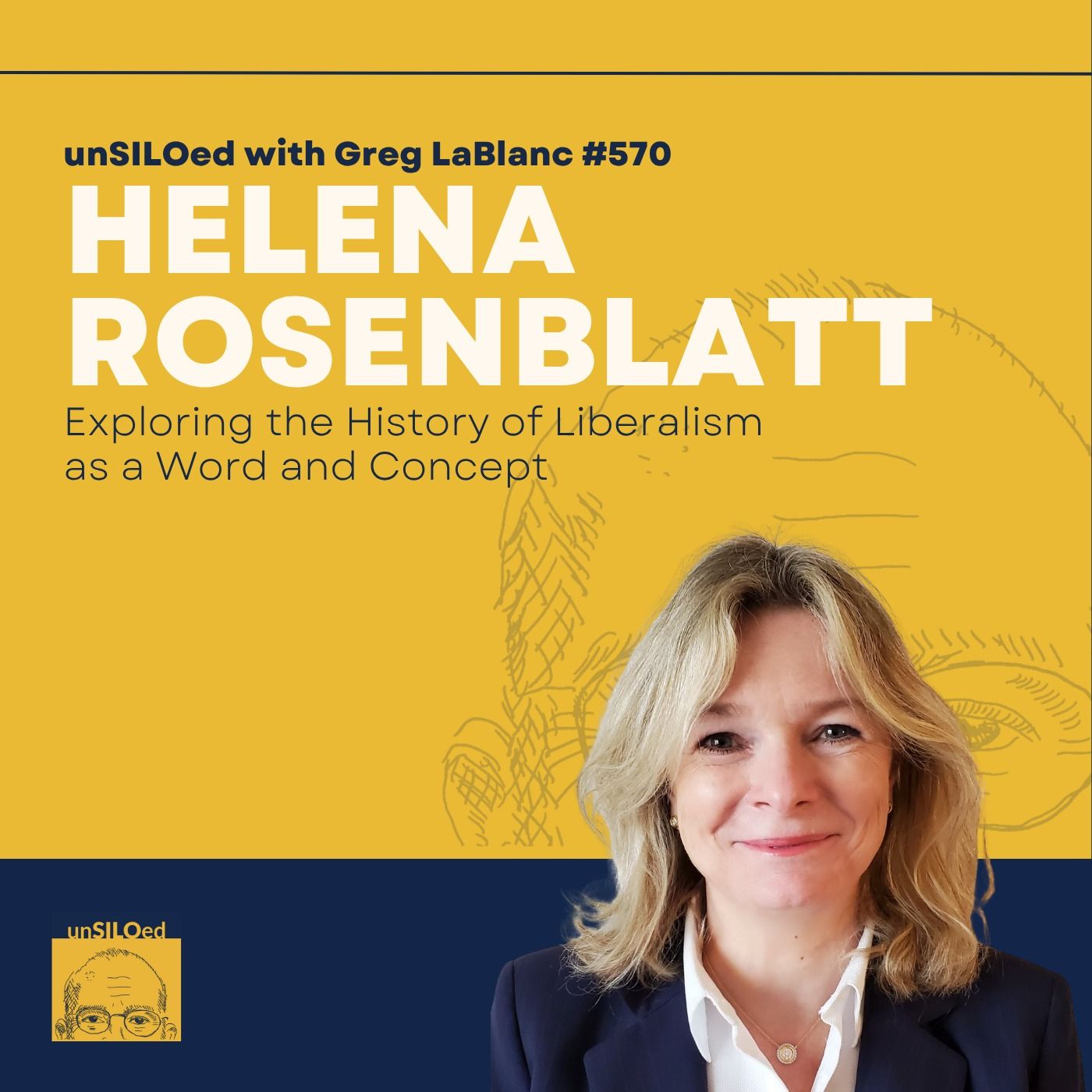Discover unSILOed with Greg LaBlanc
unSILOed with Greg LaBlanc

unSILOed with Greg LaBlanc
Author: Greg La Blanc
Subscribed: 97Played: 3,731Subscribe
Share
© All rights reserved.
Description
unSILOed is a series of interdisciplinary conversations that inspire new ways of thinking about our world. Our goal is to build a community of lifelong learners addicted to curiosity and the pursuit of insight about themselves and the world around them.*unSILOed Podcast is produced by University FM.*
573 Episodes
Reverse
Is it time to overhaul the way we study and teach ancient history? Are we limiting our ability to understand fully how the past informs the present in ways like inequality if we keep these disciplines siloed?Walter Scheidel is a professor of humanities, classics, and history at Stanford University. He’s the author of more than a dozen books, including What Is Ancient History? and The Great Leveler: Violence and the History of Inequality from the Stone Age to the Twenty-First Century.Walter and Greg discuss methodological divides between departments studying ancient history, the relevance of the Classics today, and the case for a new discipline on “foundational history.” They also explore the origins of inequality and how war, plagues, and technological advancements are the primary drivers for equality shifts. *unSILOed Podcast is produced by University FM.*Episode Quotes:How ancient innovations still shape the modern world13:37: People face similar challenges, and they should be studied accordingly. And we should try to understand how people, at the time of many thousands of years ago, put all kinds of innovations in place and bundled them together in very specific ways that really create our world—in terms of material culture, in terms of social arrangements, institutions, cognitive frameworks, if you will. Writing and literature and world religions and other belief systems, and so on, are still very much with us. They really shape everything that we do today. So the world we inhabit today is like a supercharged version of what people set up in this formative period. But they did it all over the place.Why ancient studies need a paradigm shift10:08: Unless there is some major paradigm shift or some major other shock to the system, there's really no sufficient force to reconfigure the way we approach the study of the ancient world.Redefining ancient history beyond Greece and Rome03:03: If you're a historian, you may want to ask, well, why isn't ancient history, like Roman history, part of our history patterns more generally? And to go beyond that, what do we mean mostly by Greece and Rome when we say ancient history? I think we mean two things when we evoke ancient history. One is Greeks and Romans, maybe Egyptians and Nas if you're lucky, but not, you know, Maya or early China and that sort of thing. Or, more commonly, you refer to something you think is irrelevant and obsolete. You say that's ancient history whenever you want to dismiss something—it's like, that's ancient history. So my book is about both of these meanings and why neither one of them really does any justice to the subject matter and to what our understanding should be of this particular part of history. I want to redefine it as a truly transformative, foundational phase—not so much a period, but a phase of human development that unfolded on a planetary scale and needs to be studied accordingly.Show Links:Recommended Resources:Gini coefficientBranko MilanovićKuznets curveGuest Profile:Faculty Profile at Stanford UniversityProfessional WebsiteProfessional Profile on XGuest Work:What Is Ancient History?The Great Leveler: Violence and the History of Inequality from the Stone Age to the Twenty-First Century Escape from Rome: The Failure of Empire and the Road to Prosperity (The Princeton Economic History of the Western World)Part of: The Princeton Economic History of the Western World (55 books)The Cambridge Companion to the Roman Economy (Cambridge Companions to the Ancient World)Part of: Cambridge Companions to the Ancient Athens (17 books) The Cambridge Economic History of the Greco-Roman World by Walter Scheidel, Ian Morris, et al.The Dynamics of Ancient Empires: State Power from Assyria to Byzantium (Oxford Studies in Early Empires) Hosted by Simplecast, an AdsWizz company. See pcm.adswizz.com for information about our collection and use of personal data for advertising.
When it comes to the concept of The West, its scope and principles have been criticized both contemporarily and historically. How did the West emerge as a coherent concept, and what has it meant over time?Georgios Varouxakis is a Professor in the History of Political Thought at Queen Mary University of London, where he is also the Co-director of the Centre for the Study of the History of Political Thought. He is also the author of several books, and his newest book is titled The West: The History of an Idea.Greg and Georgios discuss Giorgios’s new book, 'The West: The History of an Idea,' and explore the origins, evolution, and various interpretations of the concept of 'the West.' Their conversation covers some popular misconceptions about the West, reasons behind its historical development, and the roles nations like Greece, Russia, and Ukraine have played in shaping the West's identity. Giorgios emphasizes how the West has been a flexible and evolving idea, open to new members and continuously redefined through history. *unSILOed Podcast is produced by University FM.*Episode Quotes:The two myths of the West’s origins03:06: The popular conceptions are that the West must have always existed. People take for granted that at least since the ancient Greeks, there is a West that has resisted the invasion of Asia through the Persian Empire and that in the Battle of Marathon, the West defined itself and defeated. A projection of things that people later imagined. In this sense, ancient Greeks saw themselves as Greeks. They did not see themselves as West or Europe or anything else. The other end of the spectrum is that the West must have begun with a Cold War, that surely the West is a creation of the post–First World War situation where the United States leads a group of peoples versus the Soviet Union, and that is the West. These are the two popular extremes. Popular conceptions that I consider, the two ends of the spectrum.The West as an open-ended idea17:14: The West had inherent from its inception an open-endedness that was not based on just ethnic descent or just religion.Richard Wright: The gadfly of the West37:14: [Richard Wright] says, "I'm Western, but I now realize I'm more Western than the West. I'm more advanced than the West. I believe in the Western principles and values, and constitutional and political and other philosophical ideas. I was taught, I believe in freedom of speech, separation of, and the of. These are not necessarily practiced much of the time by Western governments and elites. So he becomes literally like Socrates was the gadfly of Athenian democracy. Richard Wright becomes the gadfly of the West, saying, 'I'm criticizing you because you're not doing the Western thing. You're not Western enough.' Literally, he says, 'The West is not Western enough.'"Why the West should be improved, not abolished47:48: My argument is peoples and their leaderships make decisions, and they may change allegiances. They may adopt institutions, alliances, and cultural references that their ancestors did not have a century or two ago, come from a country that. An experiment in that these experiments may change. You know, things may change, but I do not think anytime soon Greece will join some Eastern or whatever alliance. So to the extent that what anyone can predict, the attractiveness of the West is exactly this combination of, and an entity. As we keep saying, it should be criticized and improved. So it is not abolishing the West that I would recommend, it is improving the West and making the West live up to more of its aspirations and principles.Show Links:Recommended Resources:John Stuart MillAuguste ComteOttoman EmpirePeter the GreatCatherine the GreatGeorg Wilhelm Friedrich HegelAhmed RızaOliver GoldsmithJean-Jacques RousseauGermaine de StaëlThomas MannFrancis LieberDonald TrumpSteve BannonOswald SpenglerWestern CivilizationWalter LippmannW. E. B. Du BoisRichard WrightFrancis FukuyamaGuest Profile:Faculty Profile at Queen Mary University of LondonLinkedIn ProfileGuest Work:Amazon Author PageThe West: The History of an IdeaLiberty Abroad: J. S. Mill on International RelationsMill on NationalityVictorian Political Thought on France and the FrenchPhilPapers.org Profile Hosted by Simplecast, an AdsWizz company. See pcm.adswizz.com for information about our collection and use of personal data for advertising.
Why is historical context so important when looking at topics from the past? What role does a broader appreciation of the humanities play in understanding contemporary issues?Darrin M. McMahon is a professor of history at Dartmouth College and the author of several books. Recent titles include Equality: The History of an Elusive Idea and the Divine Fury: A History of Genius book.Greg and Darrin discuss Darrin’s intellectual journey and his approach to longue durée intellectual history. Darrin provides insights into his books on happiness, genius, and equality, exploring themes like the evolution of concepts over time, the intersection of words and ideas, and the roles of intellectual historians. Their conversation examines the connections between religious traditions and modern concepts, the interplay of born versus made attributes, and the historical perspectives on the concepts of happiness and genius. *unSILOed Podcast is produced by University FM.*Episode Quotes:Are genius, happiness, and equality born or made?41:06: Are geniuses born, or are they made? You know, can you play the guitar for 10,000 hours, à la Malcolm Gladwell, and become a Beatle? Or, you know, is there just something in you? And that turns out to be a kind of central conflict all the way back to the ancients. Same, as you say, with happiness, right? Is happiness just in our genes? We know some people are wired to just be cheery in the morning. Right? I'm not one of those people. Or does it happen to you? Right? Or can you make it? Right? Can you control your life in such a way so that you can bring about happiness? And the same with equality, right? Are we born equals? Are we made equals in political circumstance? Are we intended to be equal? This too gets tied up with debates around it, around the concept from very early on. And they never really entirely go away. So again, it's a nice way of kind of pointing out continuities, but then also marking points of departure and change.Why equality creates inequality29:37: Equality always serves, or always brings into being, new forms of inequality. That very assertion of equals then creates the space then for thinking or measuring others against that standard, and relegating to place.Intellectual history teaches us how to love49:28: Intellectual history teaches you to get inside the minds of others who see the world in radically different ways from how you do. And that is what love is all about: trying to get inside the mind of a person who sees the world differently from you, and to empathize even when you do not agree, to understand even when you do not condone. That is crucial. It is a crucial human endeavor, and I think intellectual history teaches that very well.The arc of equality isn't as straight as we think30:29: Equality leads to us, and then it's going to spread, and, you know, spill down to more and more people. It will expand and get wider. I grew up in California. I was born in 1965 with that kind of vague idea, and no one said it was going to be easy. Martin Luther King certainly knew it was not going to be easy, and yet, as you say, the arc of history bends towards justice, bends towards equality. We're gradually extending equality to wider and wider circles of people. And that's just how it will go. And I think we were deceived by our own rhetoric. And it was really a rude awakening in 2016 to wake up and realize, oh gosh, you know, it does not quite work that way. And as rude an awakening as that's been, I think it also provides an opportunity then to go back and examine a concept like equality that we thought we knew in some ways, but that really turns out to be much more complicated and fraught than I think we fully appreciated.Show Links:Recommended Resources:Longue DuréeRobert DarntonArthur Oncken LovejoyAnglo-SaxonsPlatoSubjective Well-beingJeremy BenthamThe Happiness HypothesisAge of EnlightenmentSocratesDaemonDoctor FaustusMichelangeloMichel FoucaultMemento MoriFascesTeresa BejanMartin Luther King Jr.Tall Poppy SyndromeChristopher BoehmBranko MilanovićKarl MarxJean-Jacques RousseauArthur SchopenhauerFriedrich NietzscheThomas CarlyleAugustine of HippoPresentismGuest Profile:Faculty Profile at Dartmouth UniversityDarrinMcMahon.comWikipedia ProfileGuest Work:Amazon Author PageEquality: The History of an Elusive IdeaHistory and Human FlourishingDivine Fury: A History of GeniusHappiness: A HistoryEnemies of the Enlightenment: The French Counter-Enlightenment and the Making of Modernity Hosted by Simplecast, an AdsWizz company. See pcm.adswizz.com for information about our collection and use of personal data for advertising.
There is a misconception that liberalism lacks a vision of ‘the good life,’ but liberalism is more ingrained in society than often recognized. It affects media, education, and personal beliefs of those in society both directly and indirectly.Alexandre Lefebvre is a professor of politics and philosophy at the University of Sydney in Australia, and the author and editor of several books. His latest work is Liberalism as a Way of Life.Greg and Alex discuss the historical and philosophical critiques of liberalism, discussing whether liberalism needs a theory of ‘the good life’ to remain relevant and compelling. Alexandre argues that liberalism has permeated various aspects of modern life, contradicting the common view that it is merely a procedural framework. They also explore John Rawls's philosophy, particularly his concepts of the original position and reflective equilibrium, and examine how these ideas can serve as spiritual exercises for cultivating a liberal ethos. Alexandre highlights the need for liberals to live up to their principles and examines the future challenges and opportunities for liberalism in a pluralistic society.*unSILOed Podcast is produced by University FM.*Episode Quotes:What are the goods of the liberal way of life?36:14: What are the goods of the liberal way of life? I do think that they are real goods and, at the heart of it, I would say. I mean, I think any conception of the good life kind of parks two or three virtues, kind of limit at four, I know, at the heart of what it means to live well. And then they have kind of derivative qualities and virtues flowing out from that. So, I take liberals at their word that the two major commitments they have are, let's say, to liberty and liberality, or to freedom and fairness as a kind of interpretation of what it means to be generous. And out of that comes a whole personality structure. That's what I believe. A whole psychology emanates from that. And it behooves us as liberals to cultivate that, not just because it makes us not jerks and not hypocrites, but because living according to those values and those virtues is intrinsically rewarding and joyful. [37:09] So, that's the first thing I want to say: that the liberal personality isn't just a political thing. I want to say that it disseminates into all aspects of our life, from how we deal with our wife or our husband, our romantic partners, how we raise our kids, to the kind of jokes we laugh at, the kind of stuff that makes us upset, et cetera, et cetera.Why liberalism needs more than rules09:14: If liberalism can't compel ethical assent and robust commitment, then what are we talking about? We’re done for, we can't campaign forever on just a set of rules, however noble they are. There has to be a there, there.Why do people reject liberalism?34:27: I think that a lot of people saying no to liberalism, it's not because they can't live up to its demands, but because they look at the ideals and say, no, not for me, that this is not the kind of life I want. And that the vision of the good life and the good quality is in a different direction. And I think that those are principled rejections of liberalism that make, for me, a lot of sense. And that if we want to understand the attraction of illiberalism, postliberal, all that stuff, we can't just think that these people are either cowards or afraid, or that their leaders are just motivated by the goods of tyranny—kind of sex, power, money, all that stuff. That is part of the picture, no doubt, but they're motivated by genuine ideals that liberalism crowds out.Liberalism as a way of life27:16: Philosophy is a way of life. And what I try to do in my book [Liberalism as a Way of Life] is suggest that liberalism could be seen, sort of, in the same vein.Show Links:Recommended Resources: LiberalismJohn RawlsAdrian VermeuleKarl MarxSøren KierkegaardEpicureanismLiberal DemocracyA Theory of JusticeAlexis de TocquevilleLast ManJudith N. ShklarMisanthropyPierre HadotIris MurdochDave ChappelleHannah GadsbyPatrick DeneenFrench RevolutionCult of ReasonGuest Profile:AlexLefebvre.comFaculty Profile at the University of SydneyLinkedIn ProfileSocial Profile on XGuest Work:Amazon Author PageLiberalism as a Way of LifeHuman Rights and the Care of the SelfHuman Rights as a Way of Life: On Bergson's Political PhilosophyThe Image of Law: Deleuze, Bergson, SpinozaFreedom: Lectures at the Collège de France, 1904–1905Interpreting Bergson: Critical EssaysThe Subject of Human RightsHenri BergsonBergson, Politics, and ReligionWant more like this? Give these episodes a listen:Helena RosenblattSamuel Moyn Hosted by Simplecast, an AdsWizz company. See pcm.adswizz.com for information about our collection and use of personal data for advertising.
Business leaders need to be versatile, critical thinkers capable of questioning the status quo while integrating actionable frameworks to drive innovation. How does this align with the principles today’s business school graduates are learning and will they be capable of integrating actionable frameworks to drive innovation in the future?Scott D. Anthony is a professor at the Tuck School of Business at Dartmouth College and the author of several books. His latest work is titled Epic Disruptions: 11 Innovations That Shaped Our Modern World.Greg and Scott discuss Scott's latest book, Epic Disruptions, as well as his previous works, including Dual Transformations and Eat, Sleep, Innovate. Their conversation examines the intricacies of disruption theory, its need for an update, and the complexity of business models in today's ecosystem-focused world. Scott shares insights from his extensive research and consulting experience, touching on historical examples like the iPhone, Tesla, and Julia Child, and emphasizing the importance of adapting mental models to navigate uncertainty. *unSILOed Podcast is produced by University FM.*Episode Quotes:Innovation is predictably unpredictable39:59: Scott: Randomness is absolutely a feature of every innovation story that you'll study. And the conclusion I drew from the research is that innovation has become more predictable, but it's not perfectly predictable. So I called it predictably unpredictable in that—Greg: Now, is it more predictable because we have better tools and better frameworks?Scott: I think so. I think A, we have better tools and better frameworks, and B, we really have learned the discipline of scientific method applied to strategy through lean startup, emergent strategy, and so on. So that does not mean that we can predict exactly. It does not mean that we know what is going to happen beforehand, but it means that we can confront the uncertainty in a more practiced, more methodical sort of way, so we can manage it in a different sort of way. I think that is a huge change in the innovation world. So, a combination of two things: better understanding, better research, which gives us better tools and frameworks, and then an active way to go and chip away at the things that we still will not know. But still, there is lots of unpredictability in it.Disruption changes the game08:52: The important thing about disruption is it changes the game, and by changing the game, it drives explosive growth.Why business schools must teach wisdom, not just tools44:28: There is a fundamental question of how do we make sure that it is connected to the modern world and what it needs to do? And second, technical tools are pretty easy to learn, and tools like ChatGPT, et cetera, can take it really well. We need to make sure that our students are critical thinkers that are really able to be what we are aspiring our students to be—wise, decisive leaders that better the world through business. We need to teach wisdom. We need to teach curiosity. We need to make sure that people go out with the right mindset, and that is really hard. That is not an easy thing to do in traditional classroom settings with case-based methods. I think there is still a huge role for that, and a role for simulations, experiential things—things that really push people to uncomfortable places where they learn and give them the humility, the wisdom to be able to confront an incredibly challenging world.On Florence Nightingale as a disruptor36:17: She [Florence Nightingale] goes and opens up nursing hospitals, enabling a broader population to be nurses. And like nightingales, they fly through the world. So she comes up with a really clear vision that is communicated clearly. She gives people step-by-step instructions, and she creates a cadre of people that can go and follow those instructions. And by doing so, she drives massive system change. This is disruption in healthcare—enabling a lesser-trained, lesser-skilled group of people to provide high-quality care, moving from treating bad things to preventing them from ever happening. So I love the story, because you think of her as a nurse. You think of her as somebody who helped people in a dire situation. Yes, she did all of that, but she also used data, used words, used teaching and training to change the world. Show Links:Recommended Resources:Clayton ChristensenDisruptive InnovationAlixPartnersSteve JobsAndrew GroveENIACiPhoneRita Gunther McGrathhttps://catalogue.nla.gov.au/catalog/1156427Julia ChildFlorence NightingaleFrancis BaconScientific MethodBethlehem SteelDBS BankWilliam FarrCase MethodGuest Profile:Faculty Profile at Tuck School of BusinessInnosight ProfileLinkedIn ProfileSocial Profile on XGuest Work:Amazon Author PageEpic Disruptions: 11 Innovations That Shaped Our Modern WorldThe Innovator's Solution, with a New Foreword: Creating and Sustaining Successful GrowthEat, Sleep, Innovate: How to Make Creativity an Everyday Habit Inside Your OrganizationThe Little Black Book of Innovation: How It Works, How to Do ItDual Transformation: How to Reposition Today's Business While Creating the FutureThe First Mile: A Launch Manual for Getting Great Ideas into the MarketBuilding a Growth FactoryThe Silver Lining: An Innovation Playbook for Uncertain TimesThe Innovator's Guide to Growth: Putting Disruptive Innovation to WorkSeeing What's Next: Using the Theories of Innovation to Predict Industry Change Hosted by Simplecast, an AdsWizz company. See pcm.adswizz.com for information about our collection and use of personal data for advertising.
How did political and social pressures affect public health decisions during the pandemic, and how did media reporting amplify those effects? What is the cost when experts detach from evidence-based medicine for policymaking and defer decisions to those without the proper expertise?David Zweig is a journalist, novelist, and musician. He is also the author of An Abundance of Caution: American Schools, the Virus, and a Story of Bad Decisions.Greg and David discuss David’s journey from working on a different book during the pandemic to documenting the school closure policies and their implications. They cover various topics, including public health, expertise, the state of science, partisanship, tribalism in academia and the public sector, and how those factors influenced the policy and decisions during COVID. David talks about the decision-making processes behind prolonged school closures despite falling hospitalization rates, the role of media coverage, the politicization of public health recommendations, and the long-term impact on children’s education and mental health. *unSILOed Podcast is produced by University FM.*Episode Quotes:The failure of the expert class30:39: One of the reasons that I felt motivated to spend years writing this book [An Abundance of Caution: American Schools, the Virus, and a Story of Bad Decisions], and just painstakingly trying to create a document. So I am hoping that, if I am not too big for my britches here, I hope in a decade, or a couple of decades or more from now, people will look back at the book and use this as a tool to understand: How does something like this happen, where science and evidence are ignored? And not only is it ignored, but it is ignored by the people who ostensibly are the experts who should know better. I do not spend a lot of time criticizing Trump, or, you know, Alex Jones, or conspiracy theorist people, because that's boring. I already do not expect them to know what is going on, but I do expect people with advanced degrees. I do expect physicians, I do expect these public health experts. And my book, in many ways, is a study of how those people—it is the failure of the expert class.Intuition over data15:28: Real-world, like empirical evidence, was ignored almost entirely. And when it was acknowledged, even in a minimal way, it was dismissed with a bunch of really contrived reasons that were based again on the expert's intuition. None of this was based on any evidence or data.When models reflect privilege01:07:54: It's quite important to note that the people who made the models also tended to be the people who did the best in the pandemic. That's what this guy Eric Berg's philosopher, who I interviewed, pointed out to me many times. Like, boy, that's pretty ironic that the people who chose how to create these models, they were the ones who were in comfortable homes. They were the ones who had their kid. They probably had one or another parent at home with the kid to help them with their studying. Maybe they could pay for a tutor. Maybe they went to their vacation home somewhere. If the people designing the pandemic response were in a studio apartment in the Bronx with four children, with one absent parent, and with one of the kids sick and with a learning disability, I'm pretty darn sure that their recommendations would have been quite different if those were the circumstances they were living in.Show Links:Recommended Resources:COVID-19Andrew CuomoAnthony FauciDonald TrumpCenters for Disease Control and PreventionThe New York TimesMegan RanneyWired (magazine)Graham AllisonEvidence-Based MedicineMIS-CVladimir Kogan ProfileEmily OsterDeborah BirxGuest Profile:DavidZweig.comProfile on WikipediaSocial Profile on XSocial Profile on FacebookGuest Work:Amazon Author PageAn Abundance of Caution: American Schools, the Virus, and a Story of Bad DecisionsInvisibles: The Power of Anonymous Work in an Age of Relentless Self-PromotionSwimming Inside the SunArticles for The AtlanticSubstack Newsletter Hosted by Simplecast, an AdsWizz company. See pcm.adswizz.com for information about our collection and use of personal data for advertising.
How does literature enrich our understanding of ourselves and of others, in ways that STEM fields and other forms of knowledge cannot? What is contained within the language of reading that you don't encounter with other art forms like painting or film?Arnold Weinstein is a Professor Emeritus of Comparative Literature at Brown University and the author of several books. His latest two publications are The Lives of Literature: Reading, Teaching, Knowing and Morning, Noon, and Night: Finding the Meaning of Life's Stages Through Books.Greg and Arnold discuss how literature offers unique and invaluable insights into the human experience, bridging historical and cultural divides. Their conversation examines the connections between literature and self-discovery, the challenges of teaching literature in a contemporary academic setting, and the enduring relevance of classic works from authors like William Faulkner, William Shakespeare, and Mark Twain. *unSILOed Podcast is produced by University FM.*Episode Quotes:Life doesn’t come in disciplines01:02:54: Literature helps you see history. That philosophy, et cetera, needs a good dosage of literature, which is why we created that course and let the disciplines—not the people, the disciplines themselves—do battle with each other. And there's no obvious answer here. There's no winner or loser. But the students were confused. They wanted to get what's the right take on this. Well, has anybody ever offered the right take on reality? Universities come packaged in disciplines. Life doesn't. It doesn't. All of our major problems cannot be solved with any single discipline, including economics and, you know, and coding.Literature makes us more human09:25: It's a good workout to read literature. It makes us more generous, as being able to award the notion of humanity to other people. Because I do not think you can kill them. You cannot stamp them out if you do not think back.Why great books leave you uneasy30:13: We are supposed to exit literature course, not exactly being more confused, but more embattled in a sense to see that other ways of being, as well as other ways, other values that people might have, is a kind of absolutely basic "meat-and-potatoes" element of human life. You cannot just live in your own silo, in your own scheme, even though you are locked in it. That's the point. We cannot exit ourselves.History isn’t a fairy tale40:51: If we read the books, it only tells us what we want to know, which is what we are headed towards in this society today with the current political scene. Any text that is critical of American history is considered broke and therefore removed. And I'm worried that we are going to get a generation of people who think that American history is a fairy tale, which it is not, and no amount of rhetoric can change that. That we can police and prohibit these certain kinds of texts can take over the Kennedy Center, but we cannot, in fact, change what all of that is about, which is that we are still paying the bill for the history of racism and slavery in this country. It is not solved. We can just try to put it under the rug, but it is not solved by any means. So it is in that sense that the discomfort is required. If it simply massages us, say, "oh, this is terrific," then I think we are reading the wrong book.Show Links:Recommended Resources:Harold BloomFranz KafkaThe MetamorphosisSøren KierkegaardWilliam FaulknerMark TwainAdventures of Huckleberry FinnJamesBenito CerenoBlaise PascalWilliam ShakespeareKing LearHamletOthelloIagoToni MorrisonNaked LunchGuest Profile:Profile at Brown UniversityWikipedia PageProfile at Roundtable.orgGuest Work:Amazon Author PageThe Lives of Literature: Reading, Teaching, KnowingMorning, Noon, and Night: Finding the Meaning of Life's Stages Through BooksNorthern Arts: The Breakthrough of Scandinavian Literature and Art, from Ibsen to BergmanA Scream Goes Through the House: What Literature Teaches Us About LifeRecovering Your Story: Proust, Joyce, Woolf, Faulkner, MorrisonNobody's Home: Speech, Self, and Place in American Fiction from Hawthorne to DeLilloThe Great Courses - Classic Novels: Meeting the Challenge of Great Literature Hosted by Simplecast, an AdsWizz company. See pcm.adswizz.com for information about our collection and use of personal data for advertising.
What does the female body itself contribute to the story of human survival and development, and how does it differ from other animals and specifically, other mammals? These contributions include but are not limited unique attributes for gestation, childbirth, and lactation.Cat Bohannon is a researcher, scholar, and the author of the book Eve: How the Female Body Drove 200 Million Years of Human Evolution.Greg and Cat discuss the significant role of the female body in human evolution. Cat shares the origins of her interdisciplinary approach to writing the book. Their conversation explores the evolutionary importance of maternal and infant health, the implications of sex differences in biology, the historical intersections of gynecology and sexism, and the deeply ingrained cultural norms around reproduction. Their discussion also touches on the origins of patriarchy and the impact of modern medical advancements on child-rearing and fertility trends.*unSILOed Podcast is produced by University FM.*Episode Quotes:The deep story of mammals is reproductive investment06:13: “Eve,” [the book] in so many ways, was just—it's like a giant thought experiment, right? Like, okay, what if we do take this seriously? What if we say, what if sex differences do matter? What does the current science say about where they might and what that might implicate? And how does that change the story of ocean? You know, because like the big story, like you say, of mammalian evolution is reproduction. It's reproduction. I mean, it's cool that some little bit of a quasi-reptilian jaw broke off and now we have inner ear bones, but that's not a really interesting story in evolution. You know what I mean? 06:53: You know, that's not the deep story of mammals. The deep story of mammals is reproductive investment.Why are female bodies always regulated across cultures?59:52: We seem to, in every human culture, create rules that regulate access to female bodies. One way or another, we may have a subset of rules that are more liberal—that is distinct to our culture. We may have a set of rules that are more what we would call conservative or more controlling. That is distinct to our culture. It just depends on which culture you are in. What we all do have is these damn rules.Lactation is a two-way communication system55:40: We have to think of lactation then as this kind of two-way communication platform between the maternal body and the offspring's body, right? So whether that kid's getting stressed and there's more cortisol in its saliva, or whether the mothers experiencing a stressful environment, then they are effectively biochemically communicating that to one another through that bi-directional transfer point of the damn nipple, which is one incredibly cool. There's nothing like that in the animal world. Two. Oh, okay. So then we have to think of lactation as a thing that's more than simple caretaking. It's actually a major foundational thing that happens in mammals that have nipples.Why women store special fats in their hips and butt45:28: One of the things that is really interesting is that on the maternal body, different fat depots seem to have slightly different chops... [45:48] So this gluteal femoral fat, that is your upper thighs, your hips, and your butt — those fat deposits seem to specially store different kinds of stuff. There are these long-chain fatty acids, LCFAs — long-chain polyunsaturated fatty acids. Our bodies are not good at making them from different parts. [46:26] For females, we mostly seem to store them in our butts. We start storing them in childhood, and then we keep going, and it turns out they do seem to be really important for building baby brains and baby retinas, which, by most accounts, are just an extension of your brain anyway.Show Links:Recommended Resources:PlacentaMalariaPlasmodiumEpidural, see Tina Cassidy's unsILOed Podcast episodeBruce EffectSolomonAlloparenting, see Sara Hrdy's unsILOed Podcast episodeKatie HindeUpsuck HypothesisGuest Profile:LinkedIn ProfileAlumni Profile | ButlerSocial Profile on InstagramWikipedia Entry for EveGuest Work:Amazon Author PageEve: How the Female Body Drove 200 Million Years of Human Evolution Hosted by Simplecast, an AdsWizz company. See pcm.adswizz.com for information about our collection and use of personal data for advertising.
How does status infiltrate all of our decisions, and how is status allocated in a networked society?Toby E. Stuart is a professor at the Haas School at UC Berkeley and also the author of the new book called Anointed: The Extraordinary Effects of Social Status in a Winner-Take-Most World.Greg and Toby discuss the influence of social status on various aspects of life, including consumer behavior, resource allocation, and decision-making. They explore the concept of the Matthew Effect (how status leads to more status), the interplay between status and merit, and the implications of prestige in different fields such as academia, venture finance, and entertainment. The episode also examines the role of status in creating inequality and the potential benefits and challenges of implementing measures to reduce the impact of status in decision-making processes.*unSILOed Podcast is produced by University FM.*Episode Quotes:The big shift why we trust the painter over the painting12:17: What do you do when you have to make a choice about something, but you have no real ability to evaluate its quality? Right? And, you know, that is true of so many things. Like, it is true of a hotel room you have never seen before, or a restaurant you have never been to before, or, like, you know, which of these things are going to be good? And in the book, I make the argument that what you do—I call it the Big Shift—is, if you walk into a museum, say, and you see a piece of art on the wall, I mean, you know it is in the museum, but you do not know whether it is high quality or not. But then you see the artist's name, and what you do know is, it is a Picasso, and I have heard of Picasso, and he is a very famous artist. And, in theory, he makes excellent art. And because of that, this is a very good picture. This is an amazing piece of art. But what you just did there is you took the identity of the artist and you assigned it to the art itself.Status exists only in relationships08:41: Status is a resource that is created in a social system. So individuals and groups give status to members, but it does not exist absent the social relationship. And right there, you can see the link to social networks, because flows of deferences are forms of relationships.Born on third base privilege and status56:16: So there is still today the prosperity gospel, and people who are successful often believed that it was a form of pre-ordination, like they were destined to get whatever they have, you know. But the other part of it is, you know, is best summed up by, you know, this quote I have always loved. I think, you know, the providence is occasionally debated, but it is often attributed to Barry Switzer. You know this one, and it goes: he refers to someone and he says, like, “You know, that guy was born on third base, and he has always thought he hit a triple.” Right? And that is what we call privilege these days—where you have all of these advantages. You were born with the advantages, you did not earn them, but you think you did, and therefore you attribute your status to your own merit. Versus what actually happened is you were born on third base; you did not ever hit the triple.Status on steroids in the digital age42:19: What happens when we have these digital platforms? When we have digital platforms, like anybody can get onto Spotify or Pandora or Apple Music or whatever, and they can find any piece of music literally created. Just like, you know, 99.9% of all recorded music exists on these platforms. And so you can find anybody's music. And so anywhere in the world, you can listen to the oboist—that one oboist who is the greatest in the world. So the globalization of the audience changes the nature of what happens in the marketplace, so to speak, and in a radical way. And then, if you have a cumulative advantage process which pushes people up to the top, that unfolds on steroids if you are looking at a global digital marketplace versus the way the world used to work.Show Links:Recommended Resources:Matthew EffectNetwork TheoryRobert B. ParkerWine RatingJohn Strutt, 3rd Baron RayleighRichard Wrangham - UnSILOed Episode 5Alexis de TocquevilleCaste SystemJohn D. RockefellerReformed ChristianityGuest Profile:Faculty Profile at Berkeley HaasTobyStuart.comLinkedIn ProfileBerkeley ExecEd ProfileSocial Profile on InstagramSocial Profile on XGuest Work:Anointed: The Extraordinary Effects of Social Status in a Winner-Take-Most WorldGoogle Scholar PageResearchGate Page Hosted by Simplecast, an AdsWizz company. See pcm.adswizz.com for information about our collection and use of personal data for advertising.
Many business leaders craft successful companies but only a few elevate that to the level of a masterpiece. What is it about some companies and leaders that allows them to achieve this status? How does the vision of ‘the good life’ differ across corporations, large and small?Charles Spinosa is a management consultant and the author of several books. His latest book is called Leadership as Masterpiece Creation: What Business Leaders Can Learn from the Humanities about Moral Risk-Taking.Greg and Charles discuss Charles’s vision of business leaders as artists and creators who shape organizations into masterpieces, rooted deeply in humanities and philosophy. The conversation covers various business leaders, including Jeff Bezos, and how their leadership styles create distinctive moral orders within their companies. Charles connects principles from Shakespeare, Nietzsche, and Machiavelli to modern business practices and explains how leaders can cultivate courage and virtue within their organizations. They also explore the differences between founders and inheritors of businesses, the role of leaders in shaping corporate culture, and the implications for leadership education.*unSILOed Podcast is produced by University FM.*Episode Quotes:The three questions behind masterpiece leadership18:05: My three questions are: What always goes wrong here? That tends to be an easy question for 80% of them to answer. What would you love to do instead? That is the hard question. That is the one you think is easy, but what would you love to do instead? That is hard because these men and women are geniuses at managing around what always goes wrong. They have been rewarded for managing around it, and they are good at it. And then, once we can get to “What would you love?”—what risks do you need to take to do what you would love? And that is where we begin to work out the kinds of risks, the hard risks they are going to take. Because when they make these changes, if they do not succeed, they are going to be seen as not just foolish, but actually evil. They have gone out and harmed people in careers and so forth. So we have to figure out those, and then we have to put them in a kind of strategic order. But that is, in short, my masterpiece-building strategy. Leadership as a moral masterpiece03:10: Masterpieces are not just attractive and compelling aesthetically. Masterpieces give us a distinct new way to live that we consider a good life. They are moral masterpieces, and they are morally distinctive.Cultivating courage in organizations42:34: It is not that hard to build a company that cultivates courage. When you realize that part of courage is realizing that you figure what you think is right, and then you compose a way for people to hear it.Why leadership calls for admiration22:15: I can admire Google, and I can admire Amazon. A lot of people cannot. I have had people walk out on me when I say that about Amazon. But choose another company—choose The Body Shop, choose Zuckerberg's company, Meta—quite different from Amazon. Again, if we can admire different companies, we do not have to embrace everything we admire, and that gives us a sense of different good lives that we can admire. And I want that to be the virtue that we develop, which is a step above tolerance. I mean, really, with tolerance, which is the modern virtue for dealing with difference, we tolerate things that are different that we cannot eliminate. They are too powerful. We do not consider them quite as good. We tolerate them, but it is never a happy tolerance.Show Links:Recommended Resources:Friedrich NietzscheJeff BezosWilliam ShakespeareOthelloIagoHamletJack WelchMartin HeideggerLorenzo ZambranoJames C. CollinsAmy EdmondsonIliadStanley MilgramNiccolò MachiavelliGuest Profile:Profile on Vision.comLinkedIn ProfileSocial Profile on InstagramGuest Work:Amazon Author PageLeadership as Masterpiece Creation: What Business Leaders Can Learn from the Humanities about Moral Risk-TakingKellogg on Advertising and Media: The Kellogg School of ManagementA Companion to HeideggerKellogg on Integrated MarketingPhilosophical RomanticismThe Practice Turn in Contemporary TheoryHeidegger, Coping, and Cognitive Science: Essays in Honor of Hubert L. Dreyfus, Vol. 2Disclosing New Worlds: Entrepreneurship, Democratic Action, and the Cultivation of SolidarityResearchGate Page Hosted by Simplecast, an AdsWizz company. See pcm.adswizz.com for information about our collection and use of personal data for advertising.
It’s not hard to find critics of capitalism in the current moment but this has always been true: as long as we have had capitalism we have had critics of capitalism. What are the recurring themes of these critiques and how have they helped to shape the economics profession and capitalism itself?John Cassidy is an author at the New Yorker magazine and also the author of several books. His most recent two are Capitalism and Its Critics: A History: From the Industrial Revolution to AI and How Markets Fail: The Logic of Economic Calamities.Greg and John discuss the multifaceted and varied criticisms of capitalism throughout history. Over the course of the conversation, Greg recounts how John’s books have investigated economic crises, the behavioral finance revolution, and the diverse critiques of capitalism from both the left and right. John brings up several examples of historical economic figures, from Adam Smith to Marx, and examines how crises have shaped economic thought and policy. Greg and John also make a point to highlight lesser-known critics and movements, underscoring their unsung importance of economic history.*unSILOed Podcast is produced by University FM.*Episode Quotes:When both the left and the right turn against capitalism04:05: In 2016, when Trump was running for the Republican nomination and Bernie Sanders was running for the Democratic nomination, I thought, if you go back into history, it's a long time since we've had sort of major candidates running for office as critics of capitalism from the right and the left. Bernie, of course, has always been a critic of capitalism. He's independent socialist—I'd call him a social democrat, but we can get into what those terms mean if you want. But what's really new was Trump, running from the right with a critique. I mean, people have sort of forgotten now, but when he started out, he was criticizing the banks. He was criticizing big businesses for offshoring. He was running with a critique of capitalism from the right. So that got me thinking about maybe there's a book in how we got here. How can America, sort of world capital of capitalism and always very supportive of the system, come to this state of affairs where the two major candidates are running against it basically?A historical approach to capitalism12:21: Capitalism means anything involving large-scale production on the basis of privately owned assets. Private means of production. And if you adopt that broad definition, then mercantile capitalism, slavery, the plantation economies is a form of capitalism.Why economists often miss the real economy09:51: I realized in sort of maybe the late nineties, early 2000s, that if you want to speak to an economist about what was going on in the economy and what's happening in Washington, there really wasn't much point in calling up Harvard or MIT or Chicago or whatever, because the economics department would say, "Well, we don't really have anybody who covers that. You need to go to the business school, or you need to go to the business economists." So I think maybe there's been a backlash against that since the Great Financial Crisis. I know there's been a lot of efforts inside various universities, especially in Europe, to make the syllabuses more relevant, more sort of real-world based. But I still think at the higher levels of the subject, it's still extremely abstract.Show Links:Recommended Resources:Adam SmithDot-com BubbleGreat RecessionNeoliberalismKeynesian EconomicsMilton FriedmanKarl MarxRosa LuxemburgIndustrial RevolutionCapitalismLudditeWilliam ThompsonRobert OwenThomas CarlyleGlobalizationDependency TheoryAnna WheelerFlora TristanJoan RobinsonRobert SolowPaul SamuelsonJ. C. KumarappaKarl PolanyiGuest Profile:Profile on The New YorkerWikipedia ProfileSocial Profile on XGuest Work:Amazon Author PageCapitalism and Its Critics: A History: From the Industrial Revolution to AIHow Markets Fail: The Logic of Economic CalamitiesDot.Con: The Greatest Story Ever Sold Hosted by Simplecast, an AdsWizz company. See pcm.adswizz.com for information about our collection and use of personal data for advertising.
How can lawmakers and public servants design policies which benefit from continuous learning?? How will government offices that learn and adopt agile practices be able to achieve better outcomes for the public?Jennifer Pahlka is a senior fellow at the Niskanen Center, founder of Code For America, and the founder of the US Digital Services under the Obama administration. She is also the author of Recoding America: Why Government Is Failing in the Digital Age and How We Can Do Better.Greg and Jennifer discuss why the government struggles with adopting modern digital practices such as agile and waterfall methods. She explains the disconnect between policy-making and implementation, emphasizing the need for a more integrated and feedback-driven approach. They explore other topics such as the over-reliance on contractors, burdensome procurement rules, and the essential role of user research in creating effective digital services. *unSILOed Podcast is produced by University FM.*Episode Quotes:How feedback loops can make government more agile06:07: Turns out that when you implement this policy in the way that you are telling me, we get a really perverse outcome. If there is no feedback loop to send that information back up to the decision makers, you get a lot of wasted money, you get a lot of perverse outcomes, you get a lot of angry people. But, you know, when the architects can say, or the builders can say, actually no, you can go into a discussion about that, then you have not just an agile development process, but you have a more agile government process.The system, not the people, is broken30:37: It is not that public servants are lazy or stupid. It is that the system that they are working in is just ill-fit, it is just ill-suited to the job we need it to do.Why government keeps building concrete boats30:58: So you are referring to the story I have in the book of this guy at the Veterans Administration (VA), which, by the way, has gotten so much better. He is kind of a leader now. But I am questioning him about this project that we are working on at the USDS, sort of what was pro-USDS before. It was one of the first engagements that were sort of testing out the thesis of the USDS. And I kept asking. This guy was a senior leader in technology in the VA. Like, why is it built this way? Why did you make this decision? And over and over, he says, that is not my call. You have to ask the procurement people, or the program people, or the compliance people. He just did not have answers. And I asked him why he was so deferring on all these. And he said, if they ask us to build a concrete boat, we will build a concrete boat. And I said, why? And he said, well, because that way when it does not work, it is not our fault. And that speaks to the incentives. Your incentive is to make sure that when it does not work, it is someone else’s fault.Show Links:Recommended Resources:Department of Government EfficiencyCode for AmericaAgile software developmentWaterfall modelYadira SanchezGrace HopperBrooks ActPaperwork Reduction ActOffice of Information and Regulatory AffairsCharles WorthingtonEzra KleinGuest Profile:Niskanen Center ProfileWikipedia ProfileJenniferPahlka.comLinkedIn ProfileSocial Profile on XSocial Profile on InstagramGuest Work:Recoding America: Why Government Is Failing in the Digital Age and How We Can Do BetterSubstackMedium Hosted by Simplecast, an AdsWizz company. See pcm.adswizz.com for information about our collection and use of personal data for advertising.
What does it mean to ‘know’ something, and what does it mean specifically when stated by a scientist? What is the role of debate in driving scientific progress, and how does progress get built on the bones of science that we later find to be incorrect?James C. Zimring is a professor of pathology and immunology at the School of Medicine at the University of Virginia and also an author. His latest books are What Science Is and How It Really Works and Partial Truths: How Fractions Distort Our Thinking.Greg and James discuss the complex nature of scientific thinking and the philosophical underpinnings of scientific practices. James emphasizes the discrepancies between the idealized version of science and its messy reality. They explore the critical distinction between phenomena and theoretical claims, the social constructs within scientific methodology, and the importance of understanding what it means when scientists claim to 'know' something.*unSILOed Podcast is produced by University FM.*Episode Quotes:What science is and isn’t03:18: My goal here was really to try and provide non-scientists with, as you pointed out, a more realistic assessment of what science is and what it means when a scientist says they know something. Because the hyperbole around scientific claims, although exciting, right, has also destroyed a lot of scientific credibility. The best way to lose credibility is to make a claim that you cannot possibly live up to. And at the same time, science is epistemically distinct. When a scientist says they know something, it means something different than other knowledge claims in other areas of thought. I am not a scientific imperialist. It does not mean something better, but it really means something different. And the failure, I think, to make that distinction is very damaging to how we navigate the world.Science is not about being right14:14: Science is not about being right. Science is about getting closer and closer to rightness. But scientists, we try to kill theories. That is what we do.Science is messy and sloppy1:00:45: Science is messy and sloppy, and this is what it means when a scientist says they know something, and it is very different from when anyone else says they know something. But it is quite different from what, historically, we say it means.Why is common sense thinking toxic to scientific progress?23:48: Common sense thinking is toxic to scientific progress because things that are common sense are often wrong. I mean, they are really helpful if you are wandering around the savanna trying to survive as a nomadic human. But when you are in the laboratory studying science, those things that work so well on the savanna are categorically incorrect. Unlearning millions of years of evolution of cognitive psychology is part of what it is to be a scientist, as you point, learning that we do not observe causality, learning that there are these confounders, learning that common sense things that are obvious may not be, is a large part of the scientific enterprise. And that is where it differs from what you are talking about—normal everyday thinking, especially statistics and other things.Show Links:Recommended Resources:Thomas KuhnRichard FeynmanKarl PopperA. J. AyerWillard Van Orman QuineNational Institutes of HealthBerengar of ToursTransubstantiationCharles Sanders PeirceConfoundingPaul FeyerabendMichel FoucaultPeter MeijerGuest Profile:Faculty Profile at the University of Virginia School of MedicineLinkedIn ProfileGuest Work:Amazon Author PageWhat Science Is and How It Really WorksPartial Truths: How Fractions Distort Our ThinkingTransfusion Medicine and HemostasisGoogle Scholar PageResearchGate Page Hosted by Simplecast, an AdsWizz company. See pcm.adswizz.com for information about our collection and use of personal data for advertising.
For much of America’s history, the promise of greater economic opportunities in new places was an intrinsic idea to the country’s identity. But in recent decades, it’s become increasingly difficult to pack up and chase that American dream. Why? Yoni Appelbaum is a deputy executive editor at The Atlantic and the author of the book, Stuck: How the Privileged and the Propertied Broke the Engine of American Opportunity which explores the significant decline in geographic and economic mobility in the United States over the past 50 years.Yoni and Greg analyze the historical context of mobility trends in America, the role of zoning laws, the influence of homeownership policies, and the changes brought about by millions of moves within American society. They also discuss possible reforms and a generational shift towards embracing growth and community development.*unSILOed Podcast is produced by University FM.*Episode Quotes:How America got stuck in a mobility decline16:00: For almost all of American history, when a place was thriving economically, we threw up new housing to accommodate all the new arrivals who would flock toward that opportunity. And then, 50 years ago, we pretty much made it impossible to do that. And so, as a result, when people are in a place today with declining opportunity, they really are kind of stuck—the places that they could move just can't accommodate them.The hidden costs of not building30:09: If you do not build housing that is affordable, if you do not build new luxury housing that rich people move into, thereby letting the older housing stock become available to people on, on more limited incomes, if you are not building, then you are shutting out those people. And so, it is not just the crisis of homelessness, which is a real crisis, it is also that lack of mobility.Why newcomers make communities thrive06:45: Loneliness is good, aloneness is bad, but loneliness is like hunger. It is a spur to action… [07:09] It is that loneliness of the new arrivals in town that has traditionally spurred people to form social relationships. You are much likelier to join something if you are new in town. And then, there is the other part of it too, which is that a community that is full of new arrivals will have a much more vibrant civic life.Geography as a tool for reinvention08:26: Everything that mattered about you was defined at your birth. You inherited your spot in the social hierarchy, your religion, often your father's occupation, your prospects, your identity — all of that — and largely your geographic location, right? You lived on the land your family had lived on for generations and where you expected your grandkids and your great-grandkids to live. You were defined at birth. What America did by allowing people to choose their own communities, by giving a legal right — and this was a bit of a legal revolution — the chance for people to move where they wanted to, we gave people the chance to decide who they wanted to be through their physical geography, through those serial relocations. Because Americans did not just move once, maybe not 40 times, but by moving repeatedly through their lives, Americans were able to continually reinvent themselves and to fashion their own identities. All of these things became matters of choice.Show Links:Recommended Resources:The Opportunity AtlasOkie Jacob RiisGuest Profile:Author Bio at The AtlanticProfessional Profile on XGuest Work:Stuck: How the Privileged and the Propertied Broke the Engine of American Opportunity Hosted by Simplecast, an AdsWizz company. See pcm.adswizz.com for information about our collection and use of personal data for advertising.
The evolving economic landscape makes institutional reforms in areas like finance, planning, and public infrastructure, a necessity. AI is capable of causing an economic shakeup similar to the transition from horses to steam, with far-reaching ramifications throughout the world’s economies.Jonathan Haskel is a professor of economics at Imperial College Business School, in London, and also the author of a few books, including Capitalism without Capital: The Rise of the Intangible Economy and Restarting the Future: How to Fix the Intangible Economy.Greg and Jonathan discuss how traditional institutions, intellectual frameworks, and measurement disciplines are struggling to adapt to an economy increasingly dominated by intangible assets such as software, data, and branding. Jonathan explains the complexities of valuing and measuring intangibles, the role of venture capital, intellectual property laws, and the impact of AI and general-purpose technologies. The episode also covers the necessity for institutional reforms in areas like finance, planning, and public infrastructure to better support the evolving economic landscape.*unSILOed Podcast is produced by University FM.*Episode Quotes:The two boosts of productivity31:30: When you have a general-purpose technology, which is also an invention, method of invention, you get two boosts to productivity. The first boost to productivity is in the invention sector itself—what I would call the intangible sector itself, as in the R&D and the software and all that—you get a boost to productivity there. And then the second boost to productivity is when all of those new inventions—now think of steam—start spreading out to the economy as a whole, to be used in the transport sector, in companies, in firms, and all that kind of thing.The intangible things the new economy makes03:23: What does the new economy make? It's people writing software. It's people writing movie scripts. It's people trying to think of new ways to market their product or publicize their brand or rearrange their organization. Those are all very intangible things.What makes the intangible economy unequal?18:39: We first got into this. We were thinking that spillovers would be the predominant economic force, and therefore a more intangible economy would be, in some broad sense, a more equalized economy…[19:04] But that, of course, goes against people's intuition. We think the economy, in some sense, has become more unequal. And we changed our mind during the writing of the book, actually, and ended up thinking that the forces of synergies are a force, of course, for making it more unequal.The human edge in a world of intangibles55:01: Once you start thinking about the task of coordinating the synergies and getting all these people together—guess what—that needs people, people. And scientists might be really good at that, but artists and poets and historians and students of ancient Greek—they might be really good at that as well. So, I am optimistic, actually, that the future could admit people with all sorts of backgrounds and all sorts of skills into this new world.Show Links:Recommended Resources:Diane CoyleBaruch Lev BooksIntangible AssetSoftware DevelopmentPaul RomerIntellectual PropertyDataThomas PhilliponDouglass NorthAbundance by Ezra KleinGeneral-purpose technologyEric BrynjolfssonRobert GordonGuest Profile:Faculty Profile at Imperial College Business SchoolWikipedia ProfilePrinceton University Press ProfileBank of England ProfileSocial Profile on XGuest Work:Amazon Author PageCapitalism without Capital: The Rise of the Intangible EconomyRestarting the Future: How to Fix the Intangible EconomyMeasuring and Accounting for Innovation in the Twenty-First CenturyNBER PageGoogle Scholar Page Hosted by Simplecast, an AdsWizz company. See pcm.adswizz.com for information about our collection and use of personal data for advertising.
What can be gained from looking back now at the pandemic response during COVID? What would a “postmortem” tell us about how policies were designed and how scientific discussions played out? Stephen Macedo is a professor of politics at Princeton University, as well as at the University Center for Human Values, and the author of several books including Greg and Stephen discuss the decision-making flaws during the COVID-19 pandemic, the lack of robust debate, the role of public health experts, and the increasing influence of partisanship. Stephen explores the potential long-term implications for democracy and science, the concept of noble lies, and the necessity of balancing expert advice with broader public interests. Their conversation also touches on the importance of liberal virtues and the need for both improved decision-making structures and individual adherence to professional ethics.*unSILOed Podcast is produced by University FM.*Episode Quotes:When public health crowds out public values09:52: The public health mindset is that you only pay attention to reducing disease, and so public health experts had too much power. Wider decision-making should have been made by people looking at the whole range of public values, not just disease reduction or attempts to reduce disease. So, the many things that came together—but we regard the book as a window onto the state of our democracy, and in a way, our—you know—the dangers of our epistemic tribalism, to put it that way. The degraded state of deliberation in our country.How epistemic bubbles are making us dumber50:57: We are making ourselves stupider by being ensconced in these epistemic bubbles. We are undermining our own capacity for critical thought by not being more open to disagreement.Science can’t decide for a democracy alone55:58: We need both more checking of a wide array of elites being involved in thinking, challenging, questioning decisions, but also some way of making sure—possibly through legislative oversight, House of Representatives being involved. The public voices need to be heard as well because they bear the cost of these—need to be heard as well because they bear the cost of these measures. And as we said before, science is not going to make these decisions for us. There are value judgments involved, and it is the people's value judgments that matter to some degree of risk tolerance…[56:35] We need more checking and balancing in these kinds of decisions that affect the public as a whole, and more open debate, discussion, more tolerance of disagreement—including, or maybe even especially, coming from the partisan other, as it were.Science needs scrutiny, not censorship14:17: We need empirical inquiry to test the assumptions behind these particular policies and assumptions—not censorship in advance of evidence that might be unwelcome with respect to, you know, certain kinds of policy claims. So, I think there's a wider politicization of science. I do think we need more viewpoint diversity in the academy, and people say, "Wasn't this the code word for having more conservatives?" And I'll say, yes. I think we're a bit too far out of balance. We should not reflect the American public—I mean, that's not the aim—but I think we do not take seriously enough, reasonable concerns coming from the other side of the political spectrum. So, it's a long-winded answer to your question, but I think the COVID experience is emblematic and indicative of a wider problem and deeper problem.Show Links:Recommended Resources:David HalberstamGraham AllisonNeil FergusonDavid ZweigFrancis CollinsAnthony FauciSandro GaleaStephen HaberJohn IoannidisScott AtlasDeborah BirxAlasdair MacIntyreCharles TaylorThe Federalist PapersJohn LockeAdam SmithConsequentialismBen BernankeThe Great Exception: The New Deal and the Limits of American Politics (Politics and Society in Modern America) by Jefferson CowieInsecure Majorities: Congress and the Perpetual Campaign by Frances E. LeeGuest Profile:Faculty Profile at Princeton UniversityWikipedia PagePrinceton Politics PageSocial Profile on XPhilPeople.org ProfileGuest Work:Amazon Author PageIn Covid's Wake: How Our Politics Failed UsDeliberative Politics: Essays on Democracy and DisagreementDiversity and Distrust: Civic Education in a Multicultural DemocracyAmerican Constitutional InterpretationThe New Right v. the Constitution | CATO Institute Hosted by Simplecast, an AdsWizz company. See pcm.adswizz.com for information about our collection and use of personal data for advertising.
What historical forces have led to the rise of demagogues in the past and how to they compare to the increasing power of populism today? What are the benefits and drawbacks of empowering leaders from outside politics during these times?Eric A. Posner is a professor of law at the University of Chicago Law School and also the author of several books, including The Demagogue's Playbook: The Battle for American Democracy from the Founders to Trump, Radical Markets: Uprooting Capitalism and Democracy for a Just Society, and The Executive Unbound: After the Madisonian Republic.Greg and Eric discuss the definition of demagoguery and its historical context in American politics, particularly comparing presidents Donald Trump and Andrew Jackson. They explore the rise of populism, its implications for democracy, and the role of elites and institutions. Additionally, Eric explains his views on labor market power and antitrust law reforms, reflecting on recent American political dynamics and potential future reforms.*unSILOed Podcast is produced by University FM.*Episode Quotes:How President Trump changed the presidential playbook40:43: Trump is really not that popular, but he does—but he is very popular among his base. So I think he has decided, unlike—I think most presidents want to have, like, a large majority, super majority of support. And I think Trump, at some point, realized that he would never get that. And so he wanted to maintain his base plus a few swing voters. And if that is your goal, if that is your plan, it may be fine to do things that upset a lot of people. Whereas when these norms developed—if that is what we are going to call them—they developed in a context in which there was less partisan division, less ideological strife, and it made sense for politicians to be basically more cooperative, even though they represented people with very different interests.Demagogues appeal to the emotion08:12: Demagogues appeal to emotion, but it would be wrong to say that any politician who appeals to emotions is a demagogue. There are community and “let us work together” and “let us protect people, vulnerable people,” versus this kind of hatred, which is characteristic of the demagogue, who wants to find somebody to blame for people's problems.What is the essence of populism?06:37: The virtuous people, meaning something—well, not never really clear—definitely farmers and maybe working people, versus an establishment consisting of politicians and bankers and capitalists. I think that division is the essence of populism.The threat of demagoguery33:08: Usually people are worried about demagoguery because they are worried, basically, that ordinary people will be persuaded by somebody who is evil, basically, or does not have their interest at heart. It is still with us. Never went away.Show Links:Recommended Resources:Daniel KahnemanPopulismDemagogueWilliam Jennings BryanAndrew JacksonFederalist PartyFranklin D. RooseveltPat BuchananHuey LongSecond Bank of the United StatesNapoleonDouglas MacArthurHenry GeorgeGuest Profile:Faculty Profile at The University of Chicago Law SchoolEricPosner.comFaculty Profile at NYU Law SchoolWikipedia PageLinkedIn ProfileGuest Work:Amazon Author PageThe Demagogue's Playbook: The Battle for American Democracy from the Founders to TrumpRadical Markets: Uprooting Capitalism and Democracy for a Just SocietyThe Executive Unbound: After the Madisonian RepublicHow Antitrust Failed WorkersLaw and Social NormsClimate Change JusticeThe Twilight of Human Rights LawLast Resort: The Financial Crisis and the Future of BailoutsTerror in the Balance: Security, Liberty, and the CourtsEconomic Foundations of International LawThe Perils of Global LegalismGoogle Scholar Page Hosted by Simplecast, an AdsWizz company. See pcm.adswizz.com for information about our collection and use of personal data for advertising.
How has the landscape of legal education shifted, and what ramifications has that already started having? How do politics factor into judicial appointments more than ever before, and how did we get to this point?Ilya L. Shapiro is a senior fellow and the director of Constitutional Studies at the Manhattan Institute. He’s also the author of several books, including Lawless: The Miseducation of America's Elites and Supreme Disorder: Judicial Nominations and the Politics of America's Highest Court Cato Supreme Court Review.Greg and Ilya explore issues related to Supreme Court nominations, cancel culture, and the impact of bias in legal education. Their conversation also addresses the longstanding politicization of judicial appointments, challenges within legal academia such as DEI and student activism, and the broader implications for law and society. Ilya also shares potential reforms for improving the legal profession and education system.*unSILOed Podcast is produced by University FM.*Episode Quotes:When the law becomes just another form of activism35:49: Another failure of our systems of legal education or of the culture of the legal profession. Young lawyers seeing themselves as the law or their legal tools as just another part of activism, rather than as a profession. Or law schools not teaching lawyers the same way. The way to be a good lawyer is to be able to understand and see all sides of a given argument or issue or dispute. That is how you can best advocate your own sides, your own client's position. Well, if half of that 360 degrees is illegitimate, or you cannot even discuss beyond the pale, outside the Overton window, as they say, then you are going to be a much less effective lawyer. And yes, I think the legal profession has suffered, in general, its credibility, its reputation.What universities were meant to be43:19: It is the purpose of universities to develop, to have free inquiry, to have civil debate, to confront new ideas. And if universities have not been doing that for a whole host of reasons, then I think that is a level of criticism—something that they should be held to account for.On judges and legal objectivity04:36: You would hope that law and policy are different things, because there is a reason why we separate out the judicial power, and that reason is for it to be a counter-majoritarian check. You do not need judges to buttress popular opinions. You need judges to protect against abuses of power by elected officials. You need judges to protect individual rights against mob rule. And so, it cannot be the case that what is right on the law is always going to be what the majority of policy views. When fear shapes the future of the legal profession30:27: Most students just want to get their degree, get their credential, get a job, have some fun while they are at it, and that is about it. They are not politically motivated or philosophically motivated. They are just there because—especially when we are talking about law schools, rather, or some other professional school as opposed to college—they are there because this is the next step on their career trajectory, and they are just trying to keep their head down so as not to be caught in the cancellation crossfire. And it is fear, and this is how I counsel students, is that you do not have to be a martyr. You do not have to stand up and be an individual, objecting to every injustice you face.Show Links:Recommended Resources:Ketanji Brown JacksonBurwell v. Hobby Lobby Stores, Inc.Robert BorkTheodore RooseveltJames MadisonAlexander HamiltonJohn JayMancur OlsonWilliam TreanorThe Paper ChaseLewis F. Powell Jr.John Paul StevensGuest Profile:Faculty Profile at The Manhattan InstituteProfile at the CATO InstituteProfile for Burke Law GroupLinkedIn ProfileSocial Profile on XGuest Work:Substack - Shapiro’s GavelAmazon Author PageLawless: The Miseducation of America's ElitesSupreme Disorder: Judicial Nominations and the Politics of America's Highest CourtCato Supreme Court ReviewReligious Liberties for Corporations?: Hobby Lobby, the Affordable Care Act, and the ConstitutionAmicus Brief -- Alvarez v. Smith Hosted by Simplecast, an AdsWizz company. See pcm.adswizz.com for information about our collection and use of personal data for advertising.
What if there was a system that could decide who to consult for a decision in real time? How would the diversity of the available sources affect the information gathered?Scott E. Page is a professor of management, social science, and complexity at the University of Michigan. He’s also the author of several books including The Model Thinker: What You Need to Know to Make Data Work for You, Complex Adaptive Systems: An Introduction to Computational Models of Social Life, and The Difference: How the Power of Diversity Creates Better Groups, Firms, Schools, and Societies.Greg and Scott discuss the importance of diverse models and perspectives in decision-making. Scott also shares insights on the evolving nature of information access and the role of AI in augmenting diversity in team decision-making processes. The conversation covers themes like cognitive diversity, the role of selection and treatment in maintaining diverse perspectives, and the challenge of fostering a healthy organizational culture where diverse ideas can thrive.*unSILOed Podcast is produced by University FM.*Episode Quotes:How do we design institutions for diversity and better decisions with AI01:01:46: So how do we design, especially now with AI, institutions, organizations, whether they're for-profits, universities, governments, that creates, you know, better people in a way, right? We're so focused on the allocation or the decision that's being made. At the end of the day, the decisions and the allocations are going to be made by those people. So you're getting the outcome, but you're also getting the people. And how do we kind of—and to your point about the treatment—you also want those people to be diverse, right? And you want to allow them and encourage them to be learning new things. In fact, I think you do not want to solve it because you could not solve it, because it would be like social engineering. But I think you want to have some awareness that particular institutional structures and incentives of structures that you're putting in place are not necessarily creating the world you want—or are creating the world you want.How AI’s power to curate makes culture more important than ever28:58: We all know AI can know—these are really nice knowledge maps. But the question is: when you start linking people to the knowledge maps and start saying, ‘We can dynamically bring people into the meeting and get their feedback,’ now you’re suddenly curating. I think AI’s ability to curate, to your point, is amazing. But now, let’s pull the culture thing in. How do I not feel like a gadget? How do I not feel like some sort of widget that the AI is using? I think this is where creating the right organizational team culture is going to be really important.Invisible forces behind organizational design01:01:30: What comes for free, whether you like it or not, whenever I design an institutional structure and organizational structure, are the norms, the behaviors, the beliefs, the networks—all that other stuff. The kind of dark matter that really matters for society.Why simple models fail on complex problems07:59: If you take something like inequality, it is a complex problem, right? Or the environment. It is a complex problem. Models are simple. So there is no way you can explain something complex with something simple. You are kind of explaining a 16 with a three or something. You just cannot. If the problem is this big and your model is this big, you cannot get it all. But if you have a bunch of models in conversation with one another, then I think you can, potentially, reach a deep understanding. You could predict better, right? I think it is a better way to advance science.How AI can bridge decision gaps across social inequality58:12: People who come from families who are well socially connected, who have wealth, who are educated—they get good advice on big decisions that maybe other people do not get. And you can go to the internet to get advice, but you are going to get it pointing in a thousand directions. The question is: will there be ways to have—like, will banks, will others—will they develop AI that they say, “Look, okay, we are going to approve this, but why do you not, you know, use this software and go through this process? It may help you think about particular things.”Show Links:Recommended Resources:Keynesian EconomicsJames G. MarchMarkov ModelPorter's Five ForcesCharlie MungerBayesian StatisticsPhilip E. TetlockDaniel KahnemanJohn Seely BrownGuest Profile:Faculty Profile at the University of MichiganWikipedia ProfileLinkedIn ProfileSocial Profile on XGuest Work:Amazon Author PageThe Model Thinker: What You Need to Know to Make Data Work for YouComplex Adaptive Systems: An Introduction to Computational Models of Social LifeThe Difference: How the Power of Diversity Creates Better Groups, Firms, Schools, and SocietiesThe Diversity Bonus: How Great Teams Pay Off in the Knowledge EconomyDiversity and ComplexityGoogle Scholar Page Hosted by Simplecast, an AdsWizz company. See pcm.adswizz.com for information about our collection and use of personal data for advertising.
Liberalism is a term that has been adopted and adapted in different ways over the centuries of its use. How do we need to rethink and communicate the core principles of liberalism in the face of modern challenges?Helena Rosenblatt is a professor in the History, French, and Political Science departments at the Graduate Center of the City University of New York (CUNY). She is also the author of several books, including The Lost History of Liberalism: From Ancient Rome to the Twenty-First Century and Liberal Values: Benjamin Constant and the Politics of Religion.Greg and Helena discuss the shifting meanings and history of liberalism, focusing on key themes such as the Anglo-American appropriation of liberalism, the evolution of liberal values, and the struggle between individual rights and civic virtues. Helena also touches upon the impact of religious influence, the educational system, the rise of new liberalism, and the relevance of civic education in contemporary society. *unSILOed Podcast is produced by University FM.*Episode Quotes:Liberalism began with character, not politics09:10: With the advent of Christianity, we started to talk about God's liberality towards, so there was no liberalism. The noun was liberality, as you mentioned. And then it became Christianized, and it meant then charitable. And then eventually, in the 18th century, with the Enlightenment, it started to mean tolerant and sociable. A gentleman was liberal in that he was open-minded. He was polite. He was educated, and we should not forget liberal arts education. Right? So very important to liberality. And it is good to think about today when the liberal arts, we think anyway in the humanities, are under siege, if you will, you know, and people lamenting the decline of civic engagement and of qualities of a citizen—that is what the liberal arts education was supposed to teach.Why liberalism was never meant to be direct democracy26:00 We are for the people, and we are accountable to the people. But it is for the people. It is not by the people. Government—we are supposed to be generous. We are supposed to be thinking about them. We are supposed to rule for them, but we cannot possibly allow them to rule.What happens when liberal face strongmen22:00: The notion that a strongman politics, which we are seeing again today, was something that liberals became very especially concerned with because they saw what could happen when people place their faith in a strongman who appealed directly to—you know, populism is not a recent thing. They did not call it populism then? I do not think so. But this idea that I am the people, I understand the people, your so-called representatives are just, you know, in deadlock. They cannot make—they are just talking. They are just a bunch of lawyers who, you know—this is an old, very old accusation that strongmen used in order to get, very often, elected democratically, but then unravel and destroy all the safeguards that were there or were meant to be there to safeguard individual rights, for example.Show Links:Recommended Resources:LiberalismJohn LockeThomas HobbesGermaine de StaëlBenjamin ConstantFrench RevolutionFreemasonryOtto von BismarckAdam SmithWalter LippmannLiberal PartyNapoleonRichard T. ElyFriedrich HayekAlexis de TocquevilleGuest Profile:Faculty Profile at CUNYWikipedia ProfileSocial Profile on XGuest Work:Amazon Author PageThe Lost History of Liberalism: From Ancient Rome to the Twenty-First CenturyLiberal Values: Benjamin Constant and the Politics of ReligionThe Cambridge Companion to ConstantRousseau and Geneva: From the First Discourse to The Social Contract, 1749–1762 Hosted by Simplecast, an AdsWizz company. See pcm.adswizz.com for information about our collection and use of personal data for advertising.


